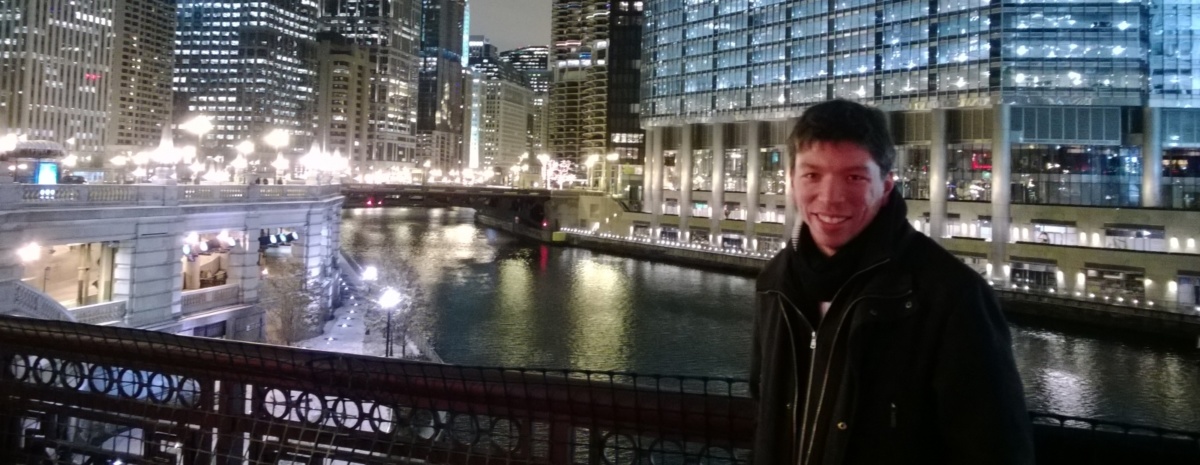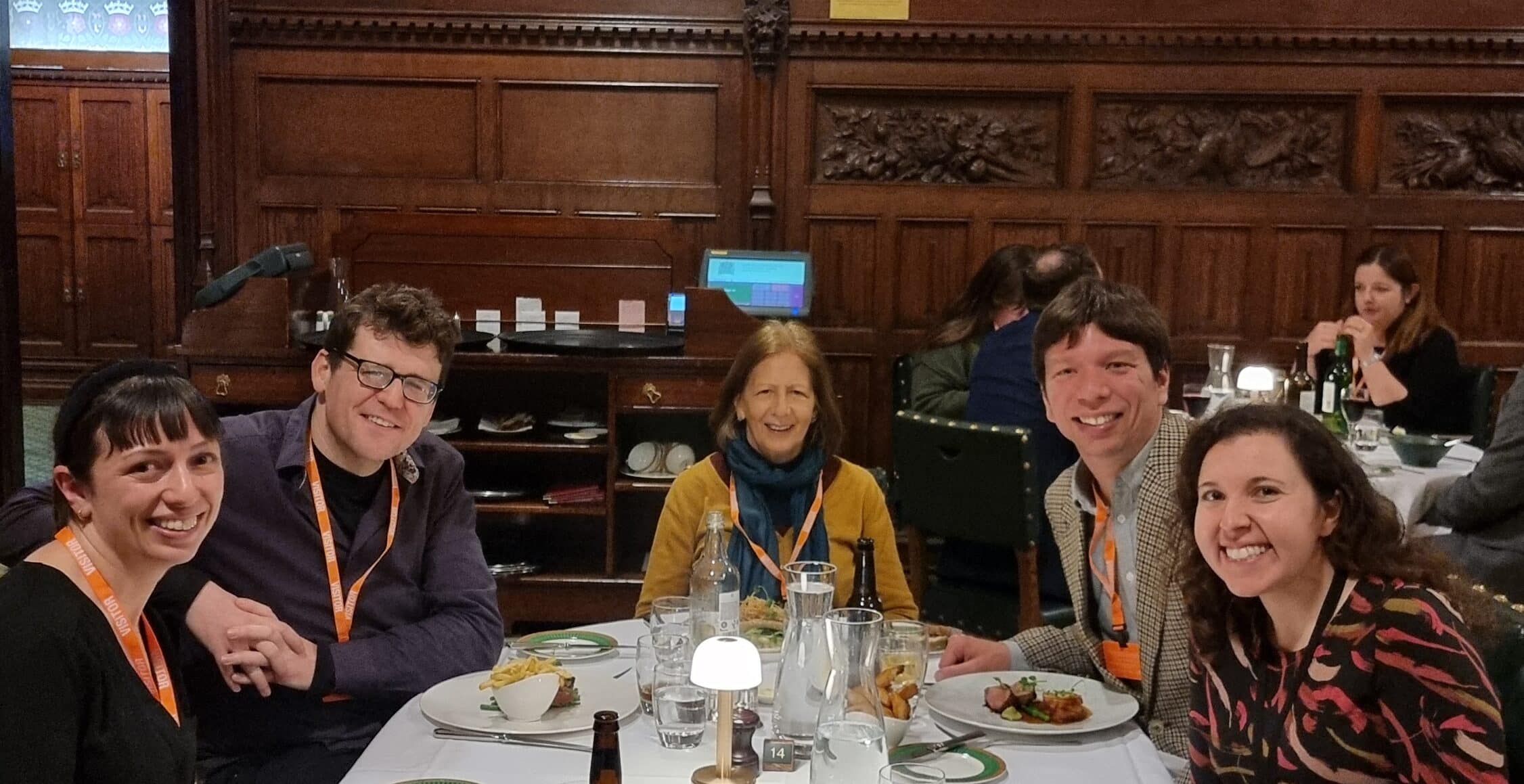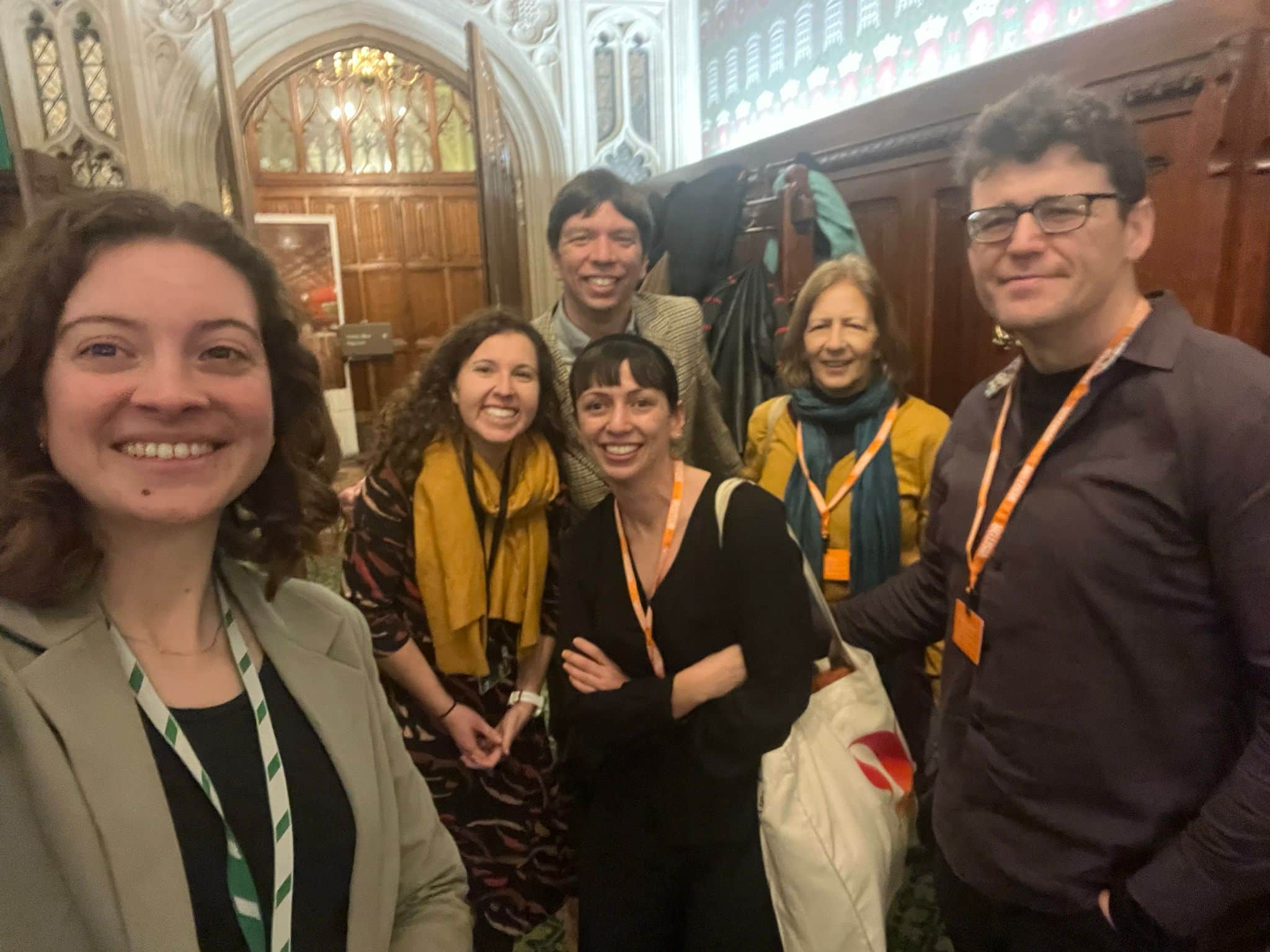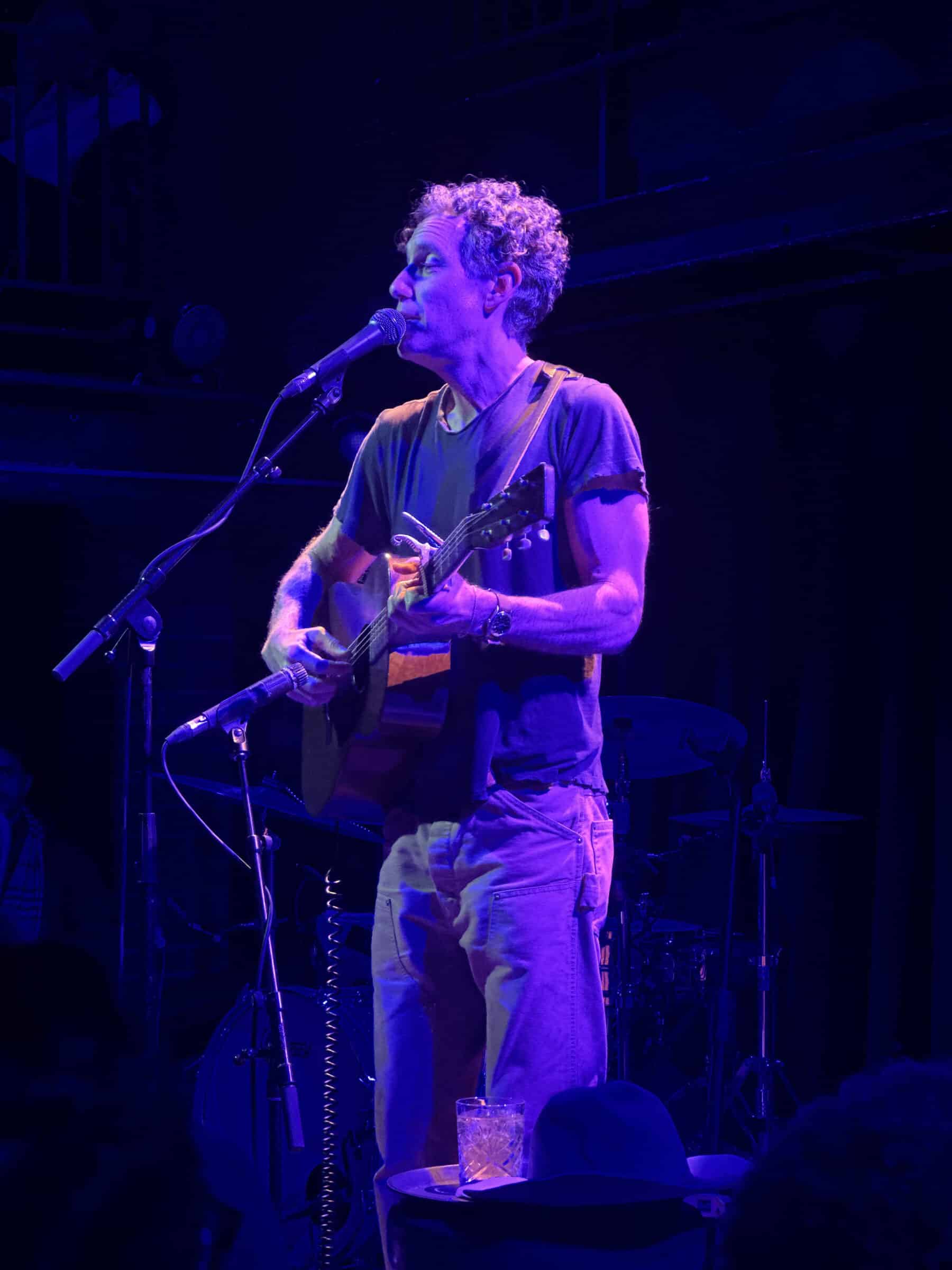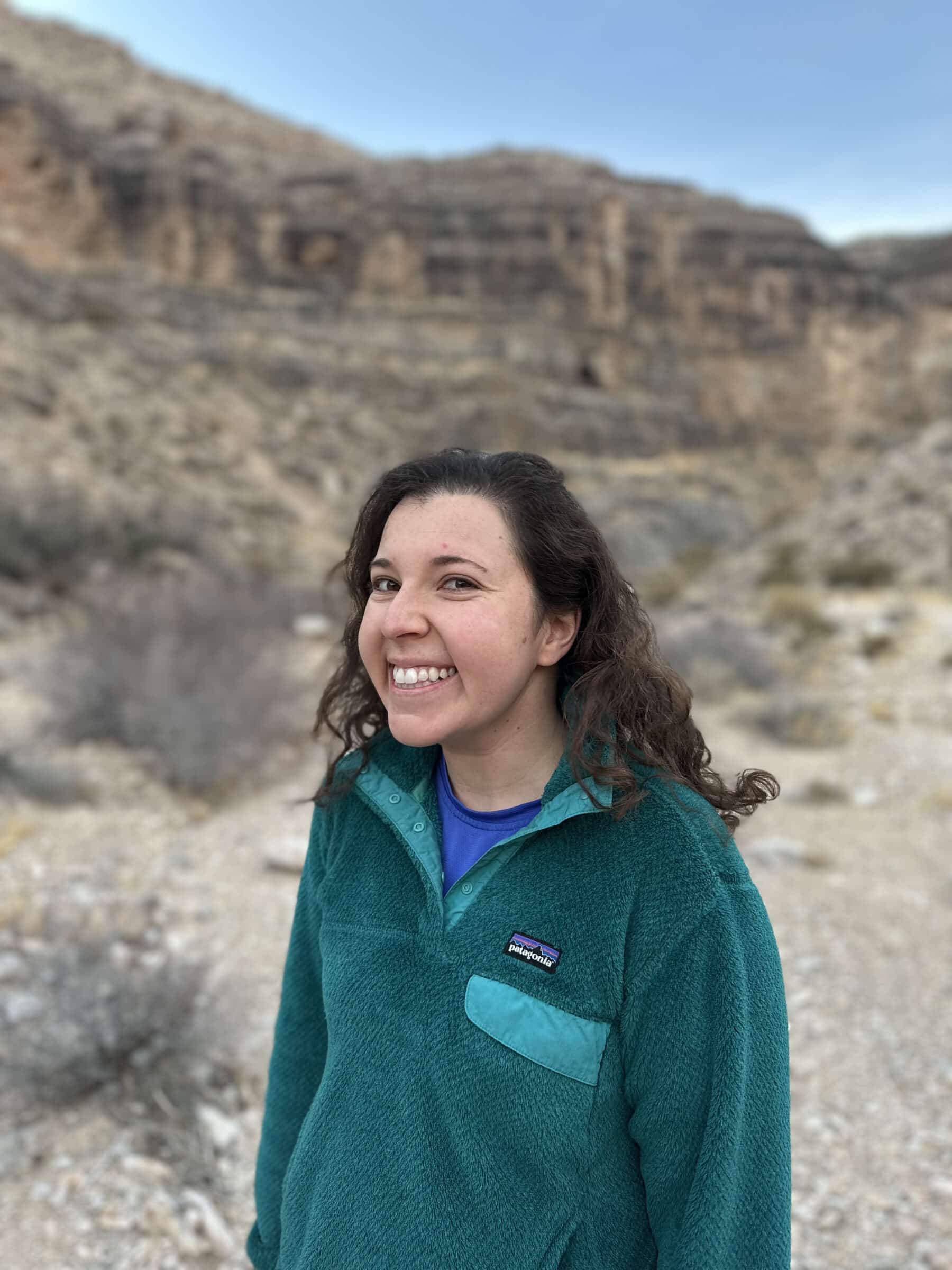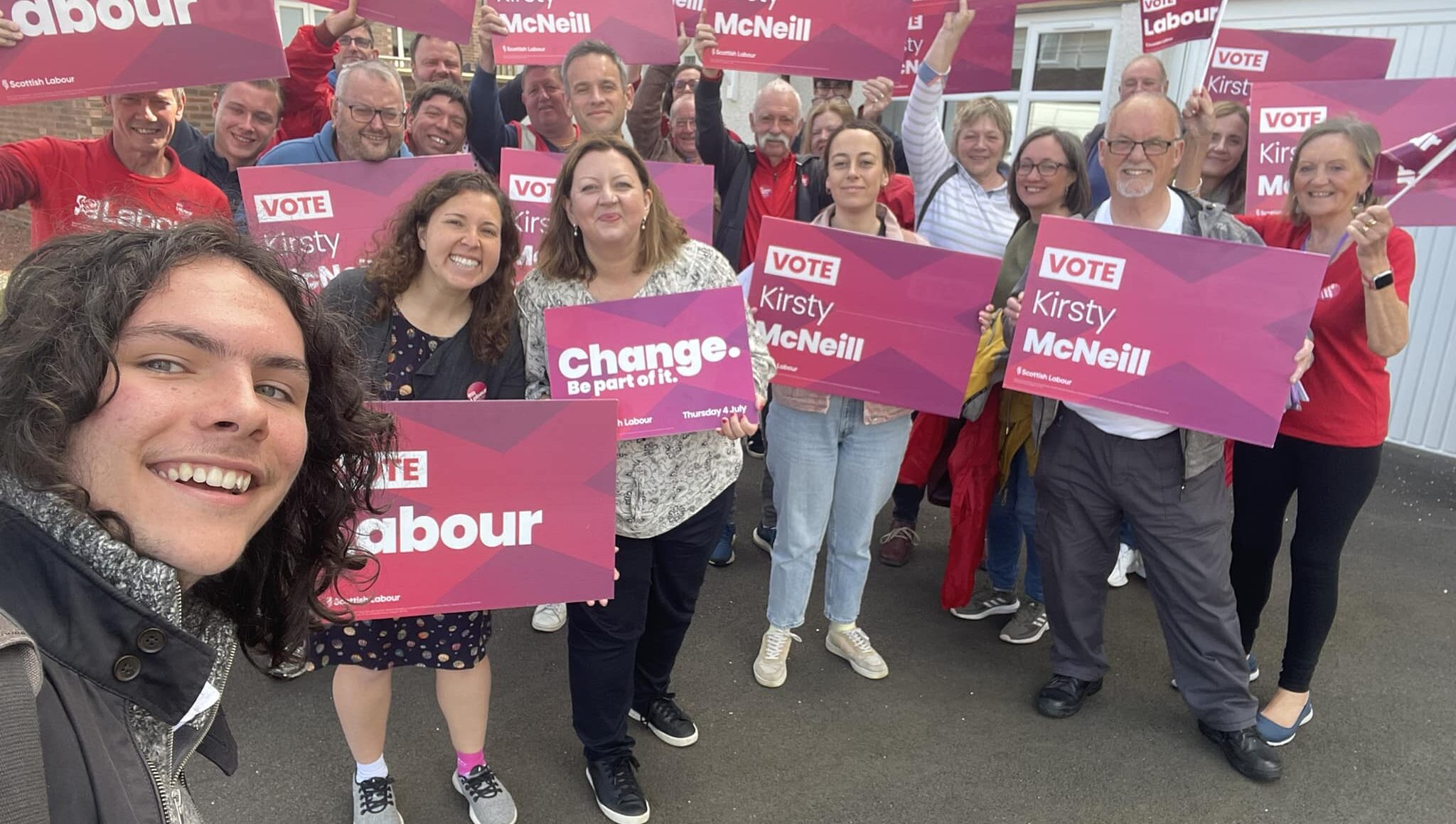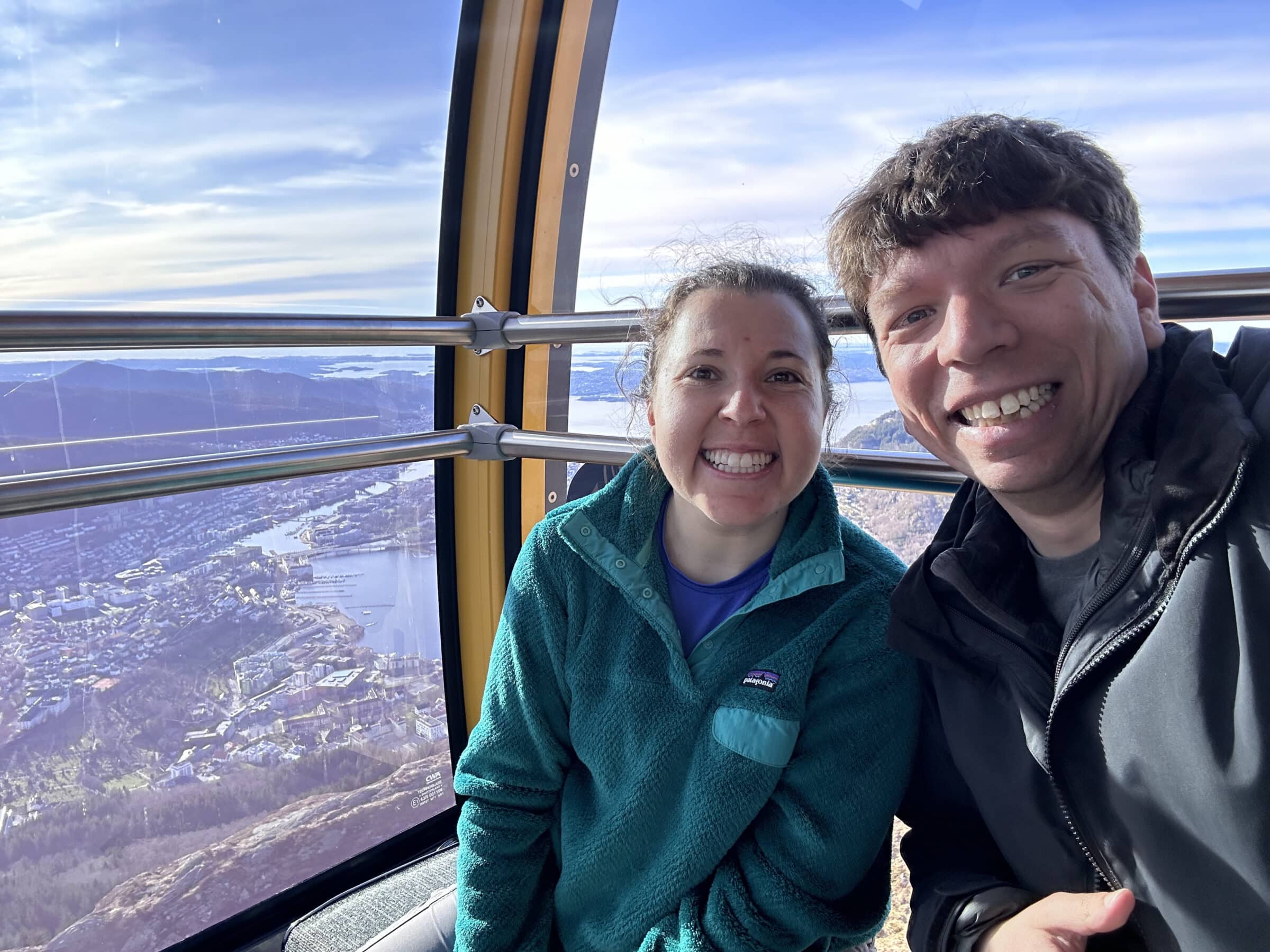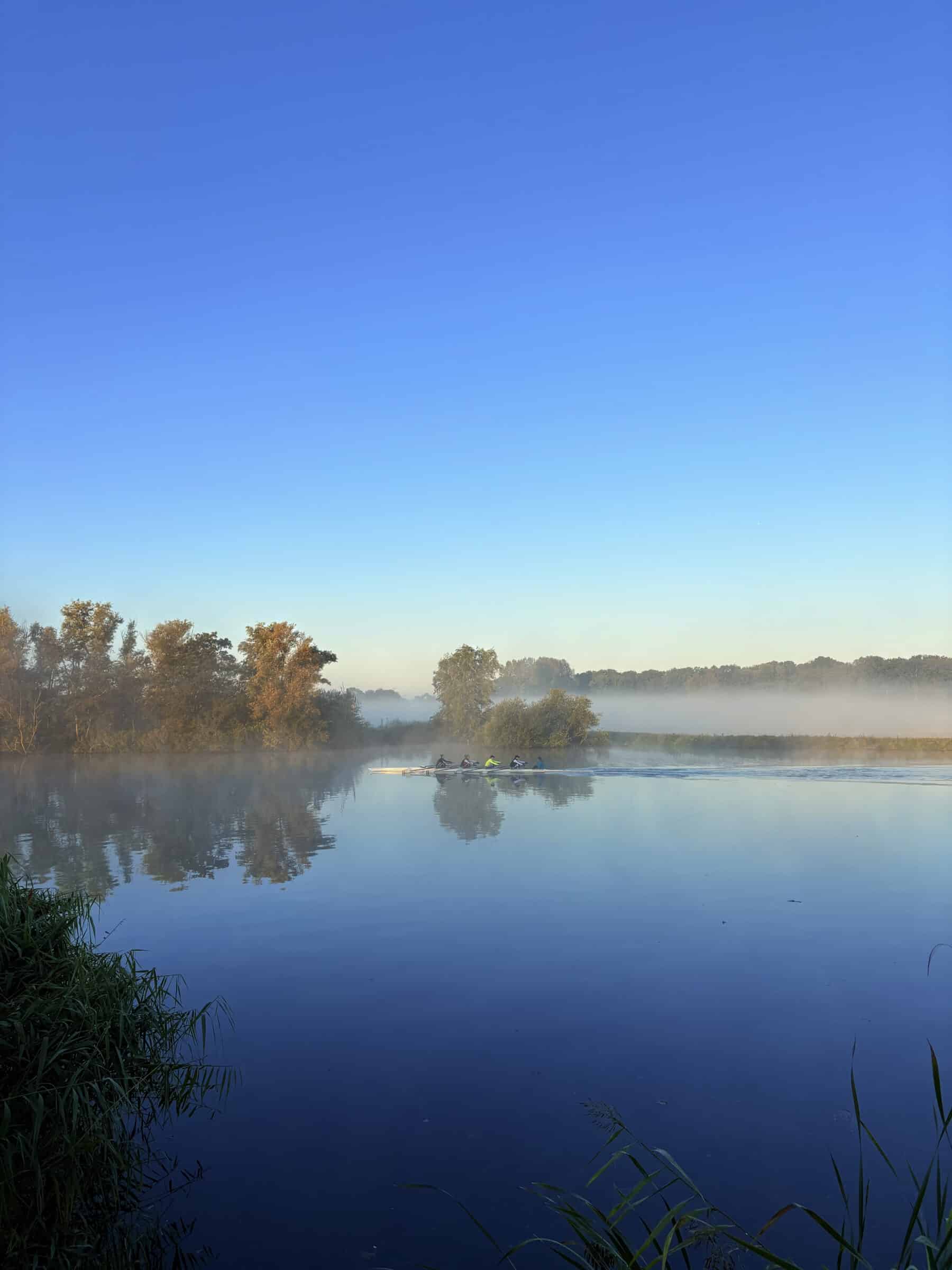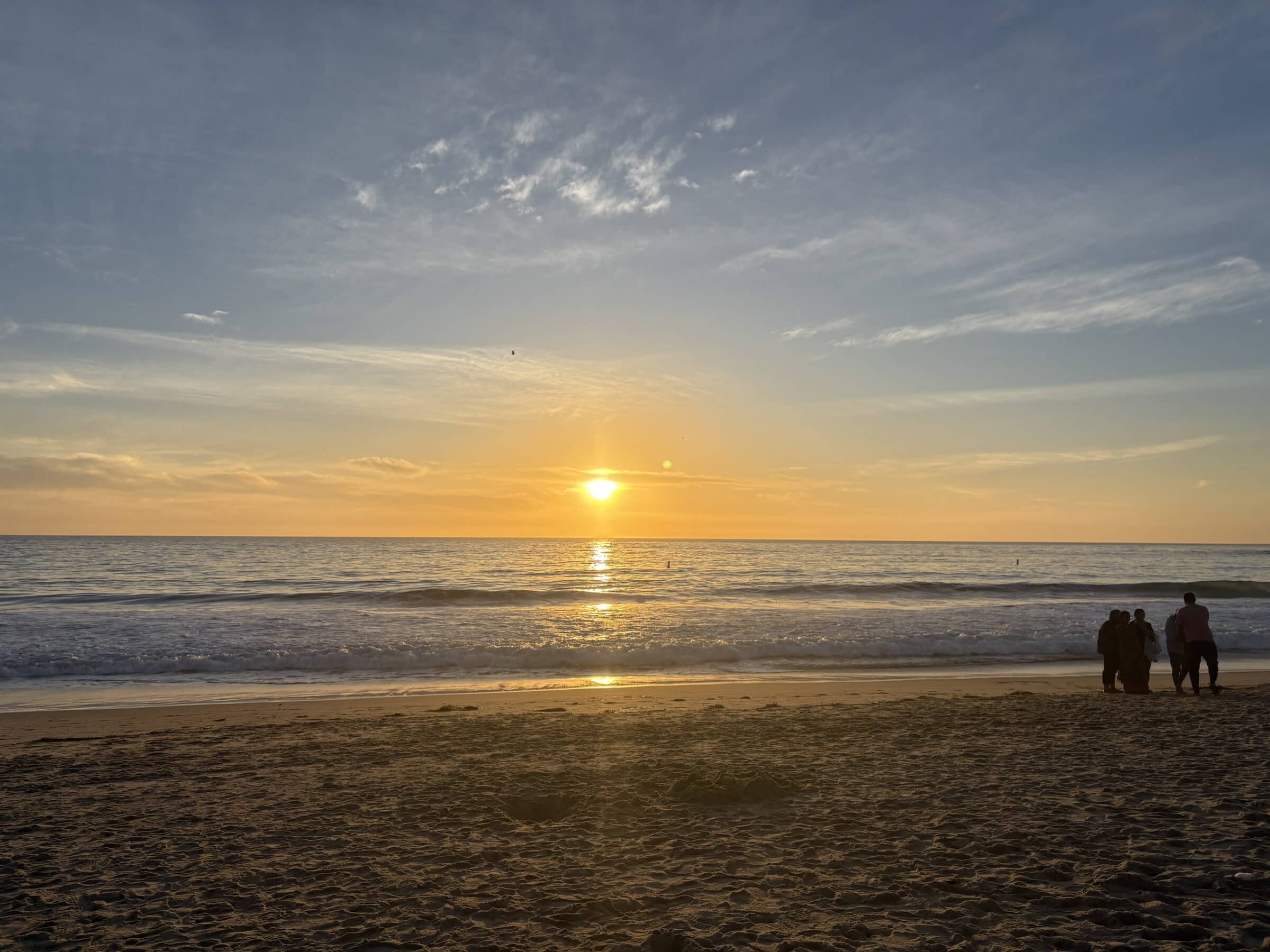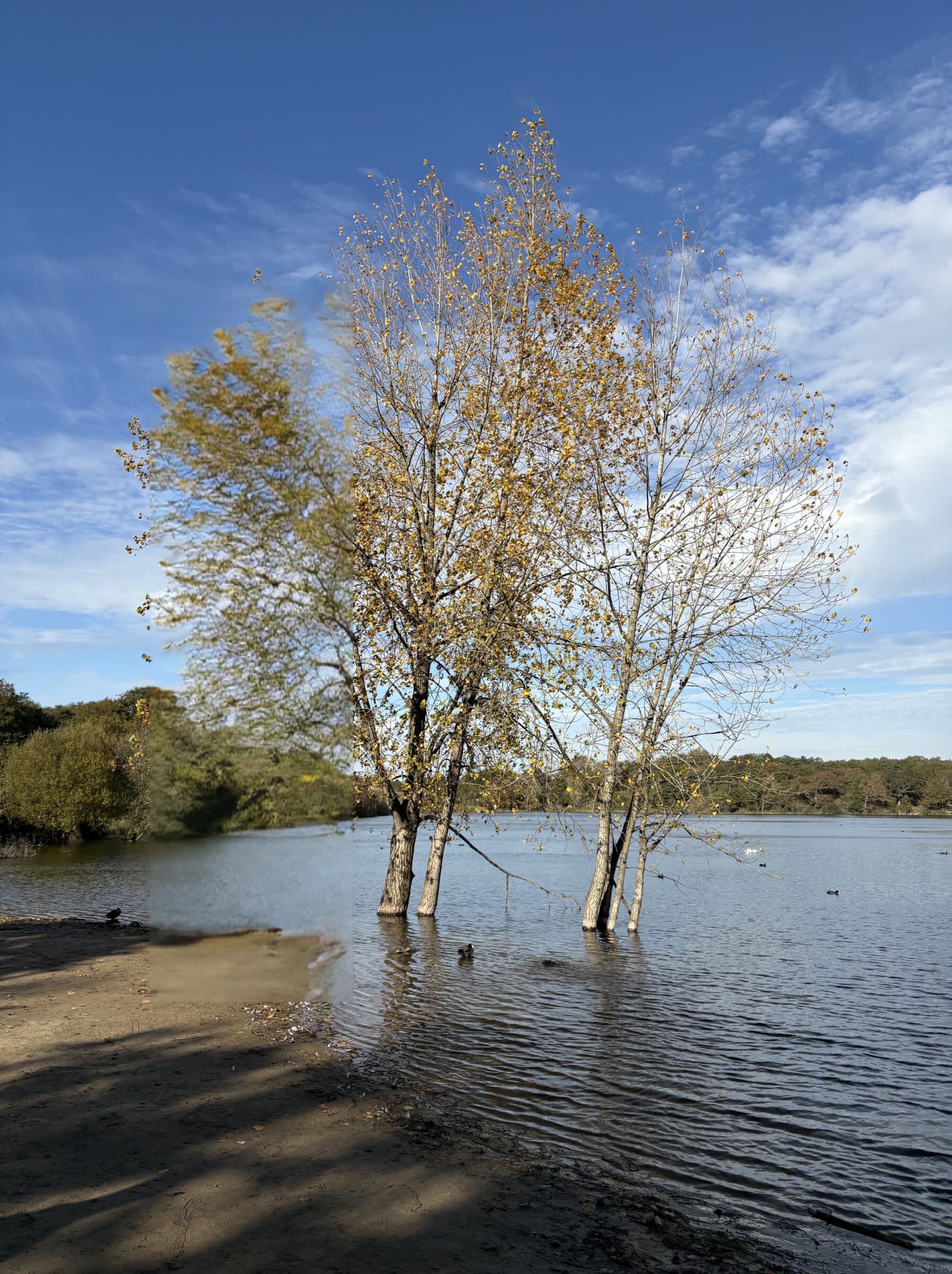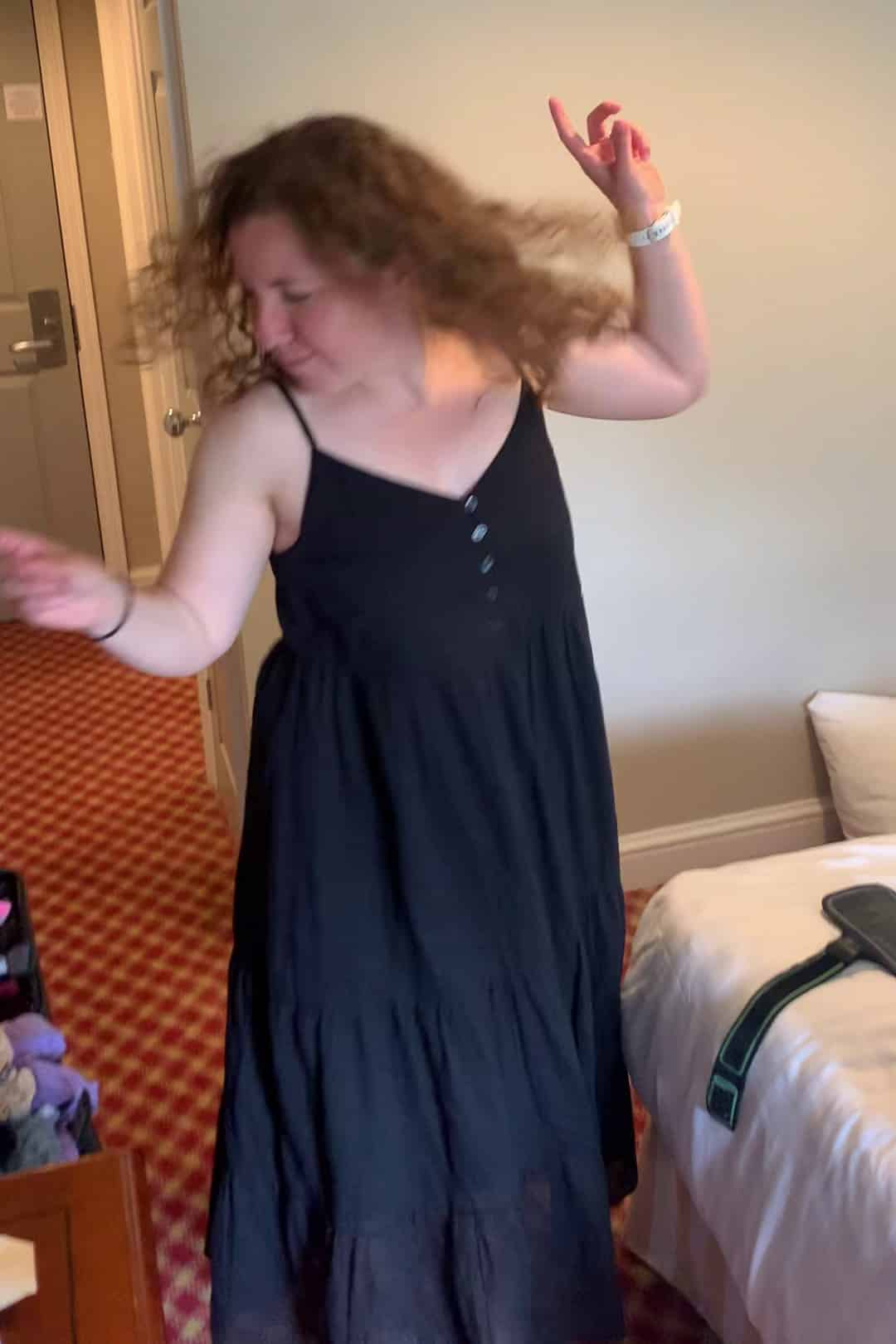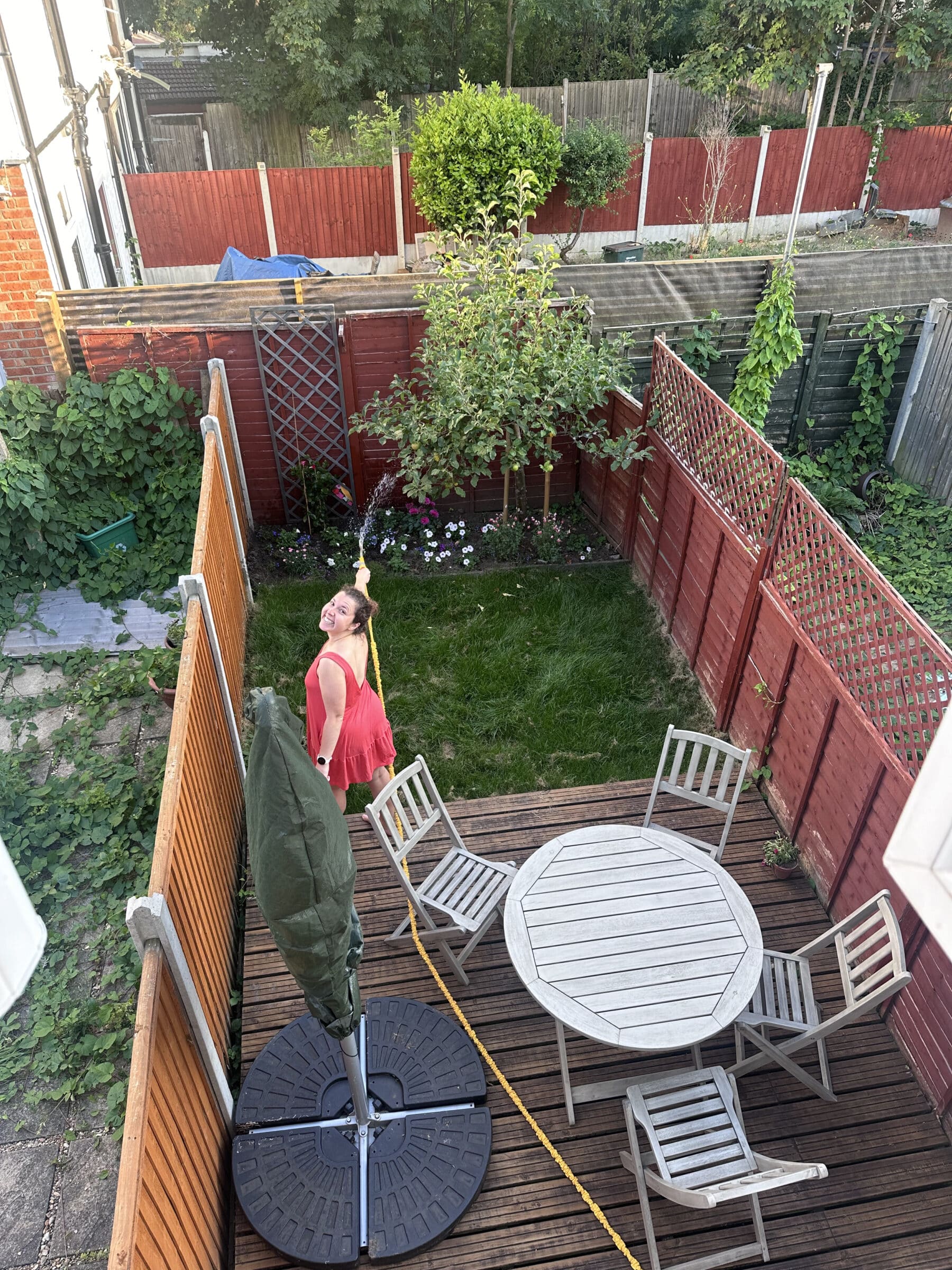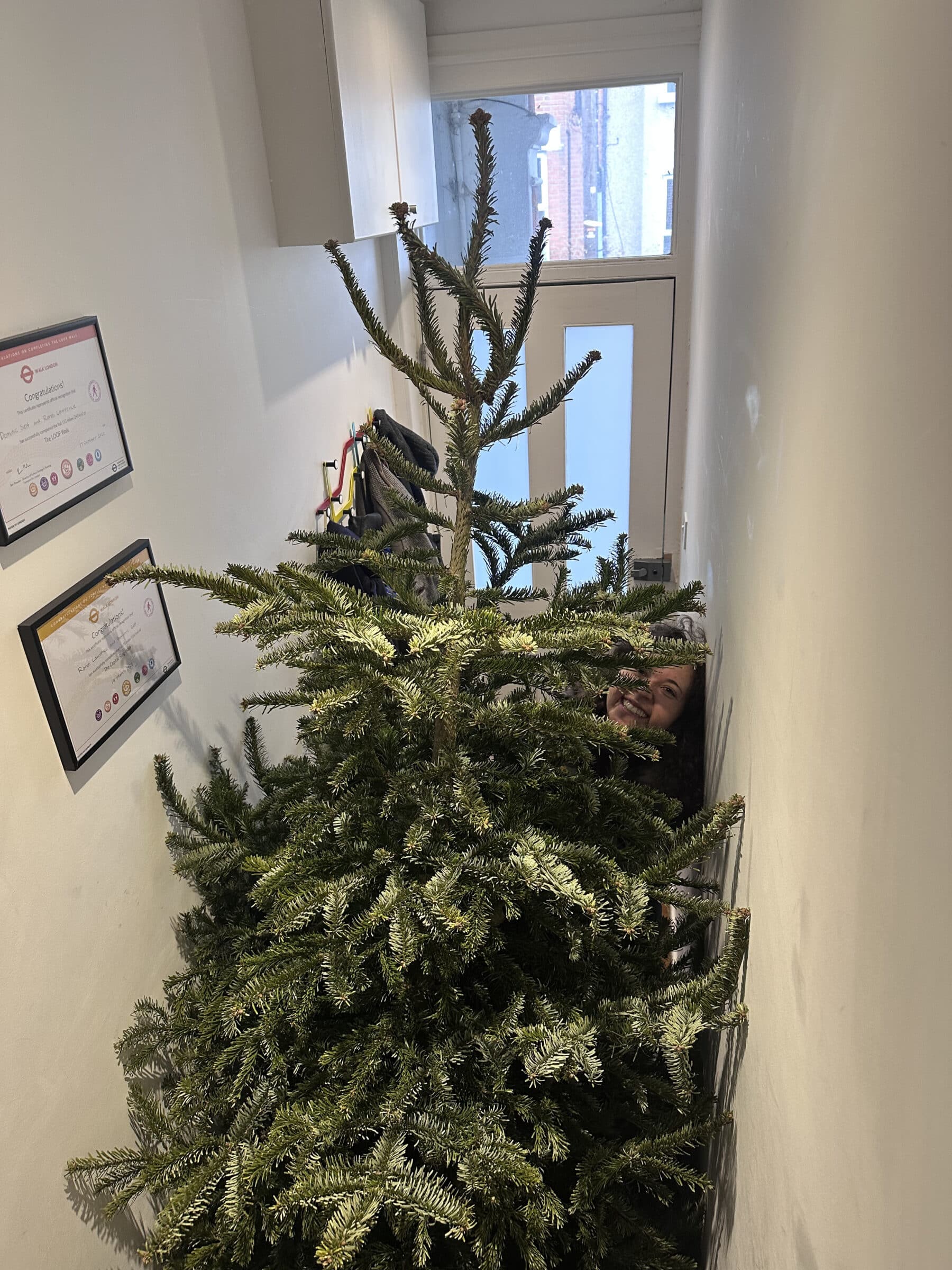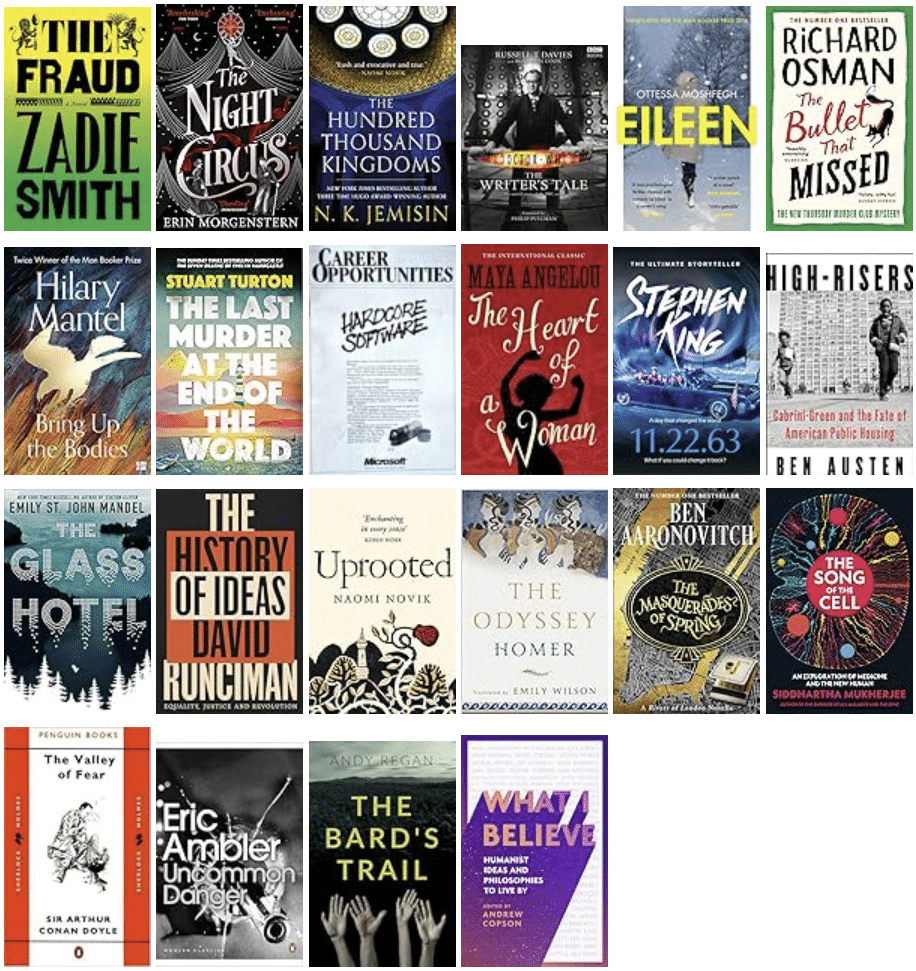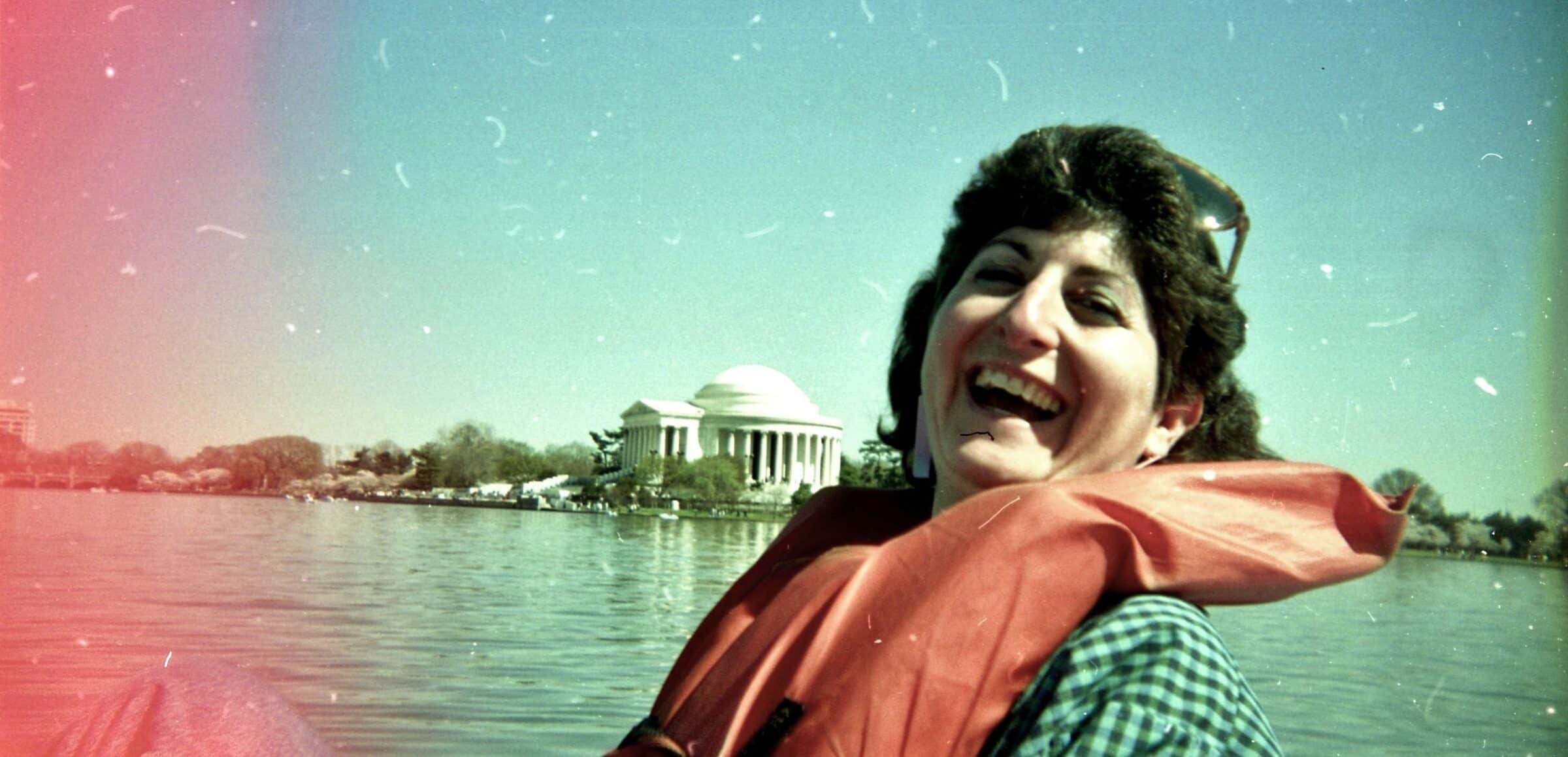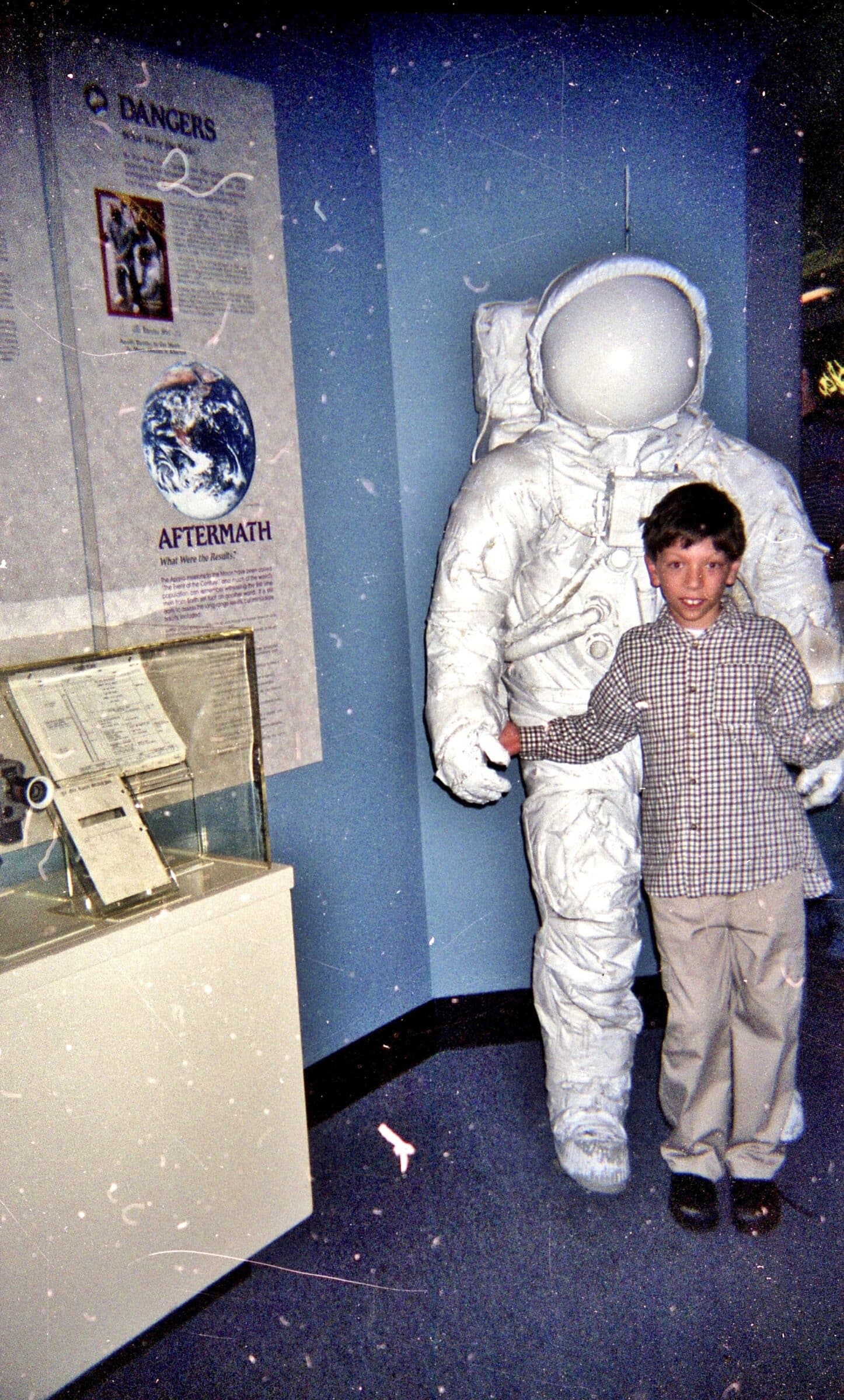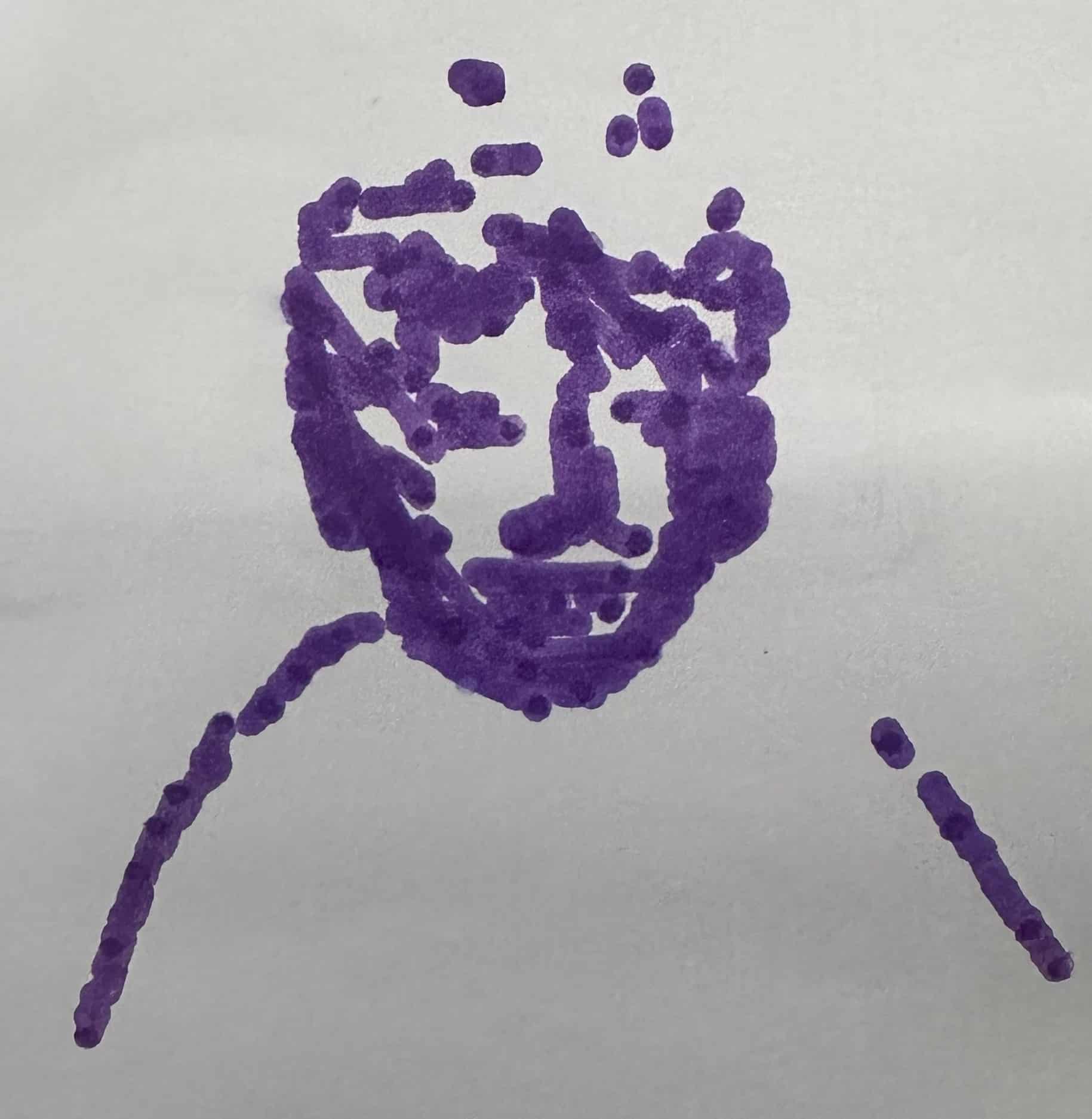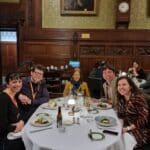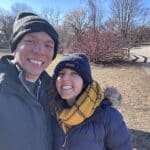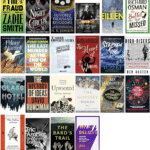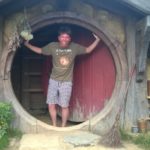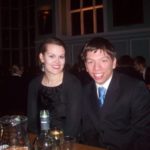I’d never seen or read Shakespeare’s The Merchant of Venice before, but I did know about its central character: Shylock, the Jewish moneylender. And I had some notion in my head that the play was ‘ambiguous’ on where it really stood: anti-semitic tropes and prejudices, but somehow combined with Shylock’s famous insistence on our common humanity. If you prick us, do we not bleed? If you tickle us, do we not laugh? If you poison us, do we not die?
Thanks to Alix’s generous gifting of tickets for us to see The Merchant of Venice 1936 last month (thank you!) I now have a much better handle on these questions, and such a good reminder that the past is a strange, distant place. The production itself was extraordinarily good – I’ll get to that in a moment. But the play itself is nothing like an ‘ambiguous’ play you might imagine today. That play would be full of characters voicing unacceptable things, and the ‘controversy’ would be: is the character channelling the playwright, or not? Does that matter? Are we being primed to agree or made to feel uncomfortable? What’s acceptable to give voice to?
The Merchant of Venice is nothing like that, because it’s unashamedly antisemitic. If William Shakespeare was on social media, he wouldn’t post a screenshot from the Notes app explaining that he was “very sorry for any offence caused” but “wanted to provoke a discussion about the discrimination faced by Jewish communities in urban Italy”. He would be baffled that you were baffled. His depiction of Jews is like his depiction of witches in Macbeth. It’s a common reference point shared with his audience, not a point of controversy.
So why is Shylock given such a humanising speech? How could someone write the words, and not be moved by them? Well – shocker -because Shakespeare was an amazing playwright! A world historical artist doesn’t write a whole script around a pantomime villain with no depth. And besides, antisemitism is not the point of the play any more than ‘witches are bad’ is the point of Macbeth. It’s much more about the hypocrisy of the Christian characters: how they fail to live up to the virtues and ethics which ‘should’ (not my framing) make them ‘better’ than the Jews.
This is obviously not a critique of William Shakespeare, the person. I’m not cancelling people from the 16th century. Yet it has unsettling conclusions. The Merchant of Venice is a great play, but I think it’s unarguable that it would have been ‘better’ for human history had it never been written. Shylock had a huge influence on depictions of Jewish people for centuries, and not in a good way. The turn towards a more sympathetic portrayal on stage only took place at the beginning of the 19th century. But now we’ve passed through the valley of time, and all the damage has already done, so what to do now?
I think the answer is exactly The Merchant of Venice 1936. Tracy Ann-Oberman is electrifying as a female Shylock, living amidst the rising tide of British fascism in London’s East End. The words are the same, but the production is a tour de force of acting and direction, and of how much power they have to cast the same words in a different light. There’s a famous scene where Shylock discovers his/her daughter Jessica has run off to elope with a Christian, stealing a load of coins and jewellery in the process. On the page, it seems very clear that he’s more upset about the money. On stage, Shylock’s despair is more of a mental breakdown, her words unmoored from the real grief underneath. And so on and so on.
I loved it, and I loved watching something with an audience struggling with an alien culture. (There was a literal gasp at Shylock’s forced conversion to Christianity, which makes me laugh because this provokes a much stronger and more visceral reaction today than the threat of death!) And what I’m not saying is “oh, what a timely reminder of the evils of prejudice”, as if somehow we were at 95% racism in 1596 and then maybe we dropped to 50% by 1996 but now we’re back up to 65% so it’s a good moment for an intervention. Of course, at some very reductionist level there are endemic human evils – like group hatred and dehumanisation – which always reoccur, and should always be resisted and fought. But at a less abstract level, in specific cultural norms, you can really feel the tectonic plates shift over time.
Also in January, Randi and I went to see Conclave at The Ritzy in Brixton, after my mum took pity on me for having managed 0 cinema outings last year and suggested this to start 2025 on a better footing. I have to say, it didn’t make me feel optimistic about the format: the cinema was nice, and our screen was surprisingly full, but I was shocked at how cheap and terrible the trailers have become. It felt like we were huddled together for a final communion before our church was shut down. Fortunately, Conclave itself was immensely enjoyable. It might not be very deep – and we’re unsure whether the filmmakers know that – but it’s a rollicking adaption of Robert Harris’s (presumably!) page-turning novel about the election of a new pope, and the performances are excellent.
A few days later I could thank my mum for her recommendation in person at Strangers’ Dining Room in Parliament, which Randi organised as a suitable august venue for a family dinner with Tash and Cormac. Outside we also had a quick catch-up with Tash’s friend Sarah, who – weirdly – is now an MP. (To be clear, it’s not weird that she’s an MP. It’s just weird that my younger sister’s friend from school is an MP.)
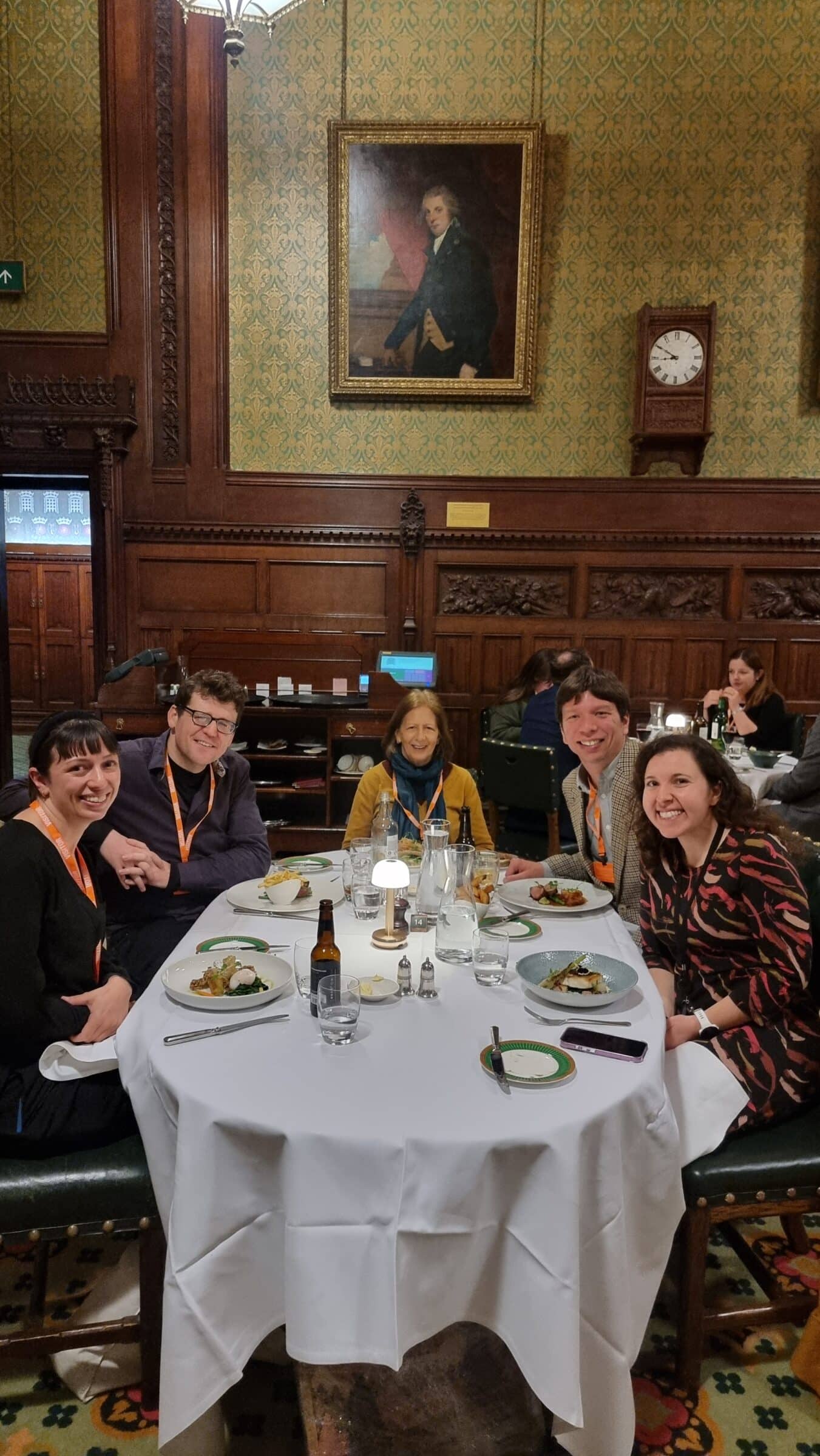
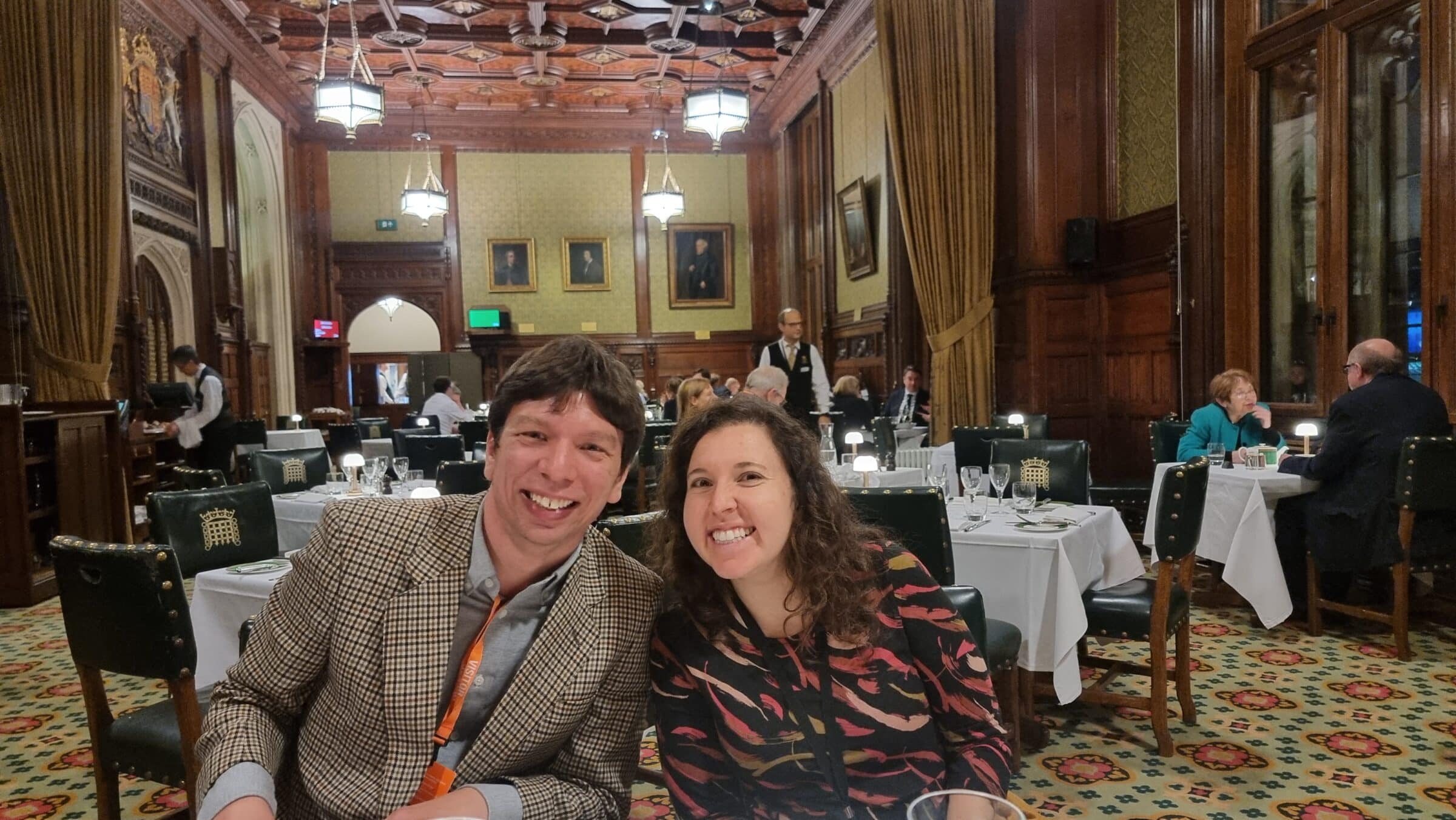
I’m also pleased to say that my mum and I are now laptop twinsies (RIP old laptop, lost too soon to water damage) so we had a quick handover session at the weekend with her new baby. Otherwise, Randi and I have been doing lots of planning for the year, interspersed with occasional games of Carcassonne – it’s been a while! – and trying out new expansions with various levels of success. (Capturing meeples via The Tower was not a hit.) We also finished the first season of Severance – what an amazing finale! – and saw Joshua Radin and Ellen Krauss perform one night in Camden. Joshua was very popular with teenage Randi and he does have an infectious American optimism. Plus Ellen Krauss was very good too!
Happy 2025!
We had always planned to spend Christmas with Randi’s family this year, so it was both good and bad timing for us to land in Vegas barely a day after her uncle died. “We managed to take the shortest day of the year and make it the longest”, noted Randi sometime during the flight, which I was touched to see included Christmas cracker hats as part of the onboard meal.
The night before we got a chance to hang out with Tash, Cormac and Katie at our place – which was really lovely – and play dual variants of the “secret rating out of 10” game. We also ate a lot of cheese and exchanged our Secret Santas, wrapping up our final night with this year’s beloved Christmas tree.
Back in Vegas, the closest we got to the Strip was spotting the giant illuminated Sphere as we landed. In fairness this is not exactly hard to spot, and while it’s a cool thing to exist in Vegas, I’m sure the residents of Stratford are grateful for Sadiq Khan blocking a London version descending in the middle of Stratford. To be clear, neither of us had any desire for tourist Vegas. Instead, we were very happy to be able to (finally!) redeem our last wedding gift voucher from Toggolyn – don’t worry, $25 still goes very far at In-N-Out – and then taking it back to Randi’s uncle Ron and aunt Stacy for some much-needed family time.
Finally, before our drive back to California, Randi led me on an early morning walk at the edge of the city, where we could look back just as the sun was coming up and see a much more beautiful place than I typically imagine Vegas to be.
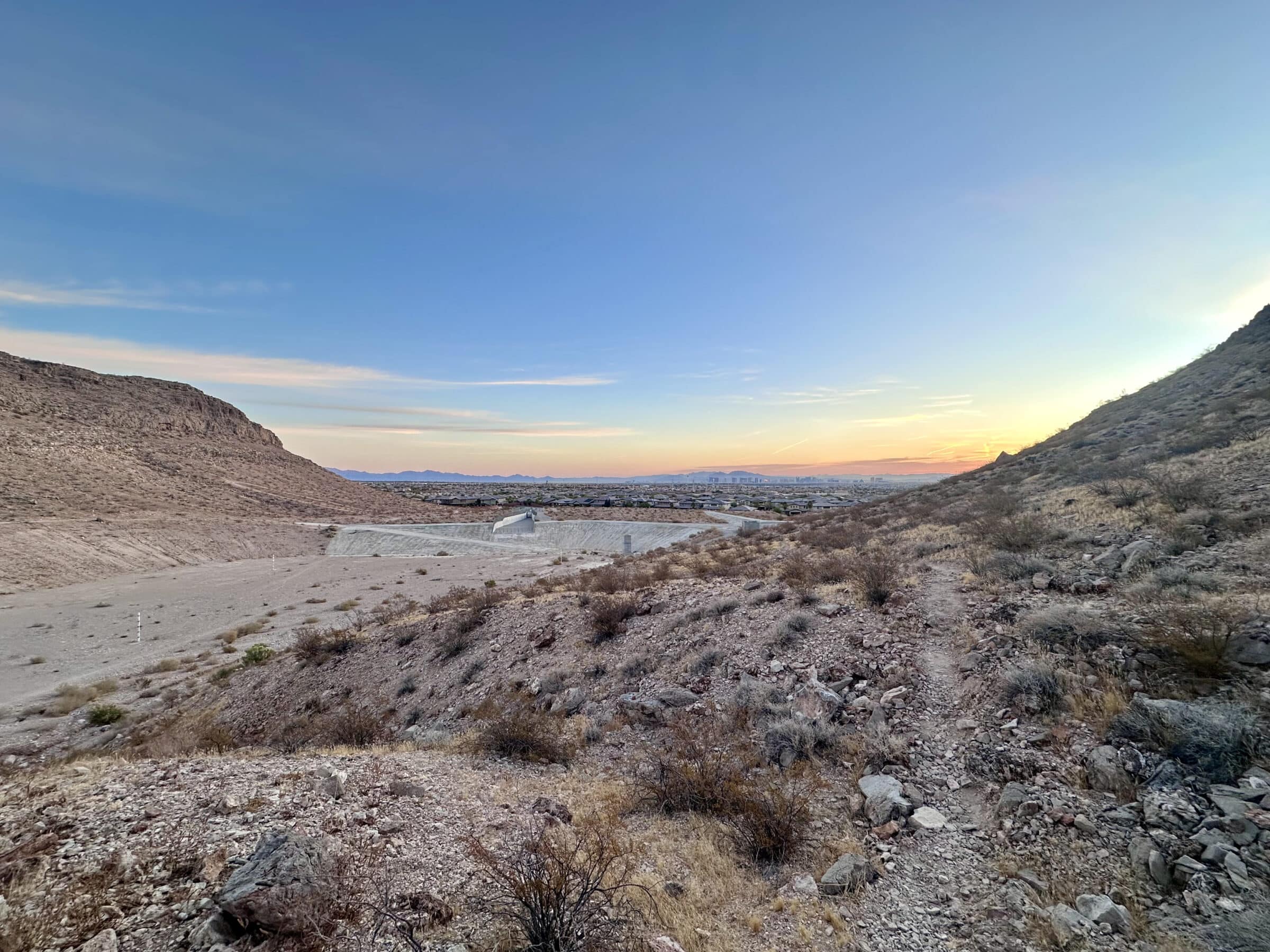
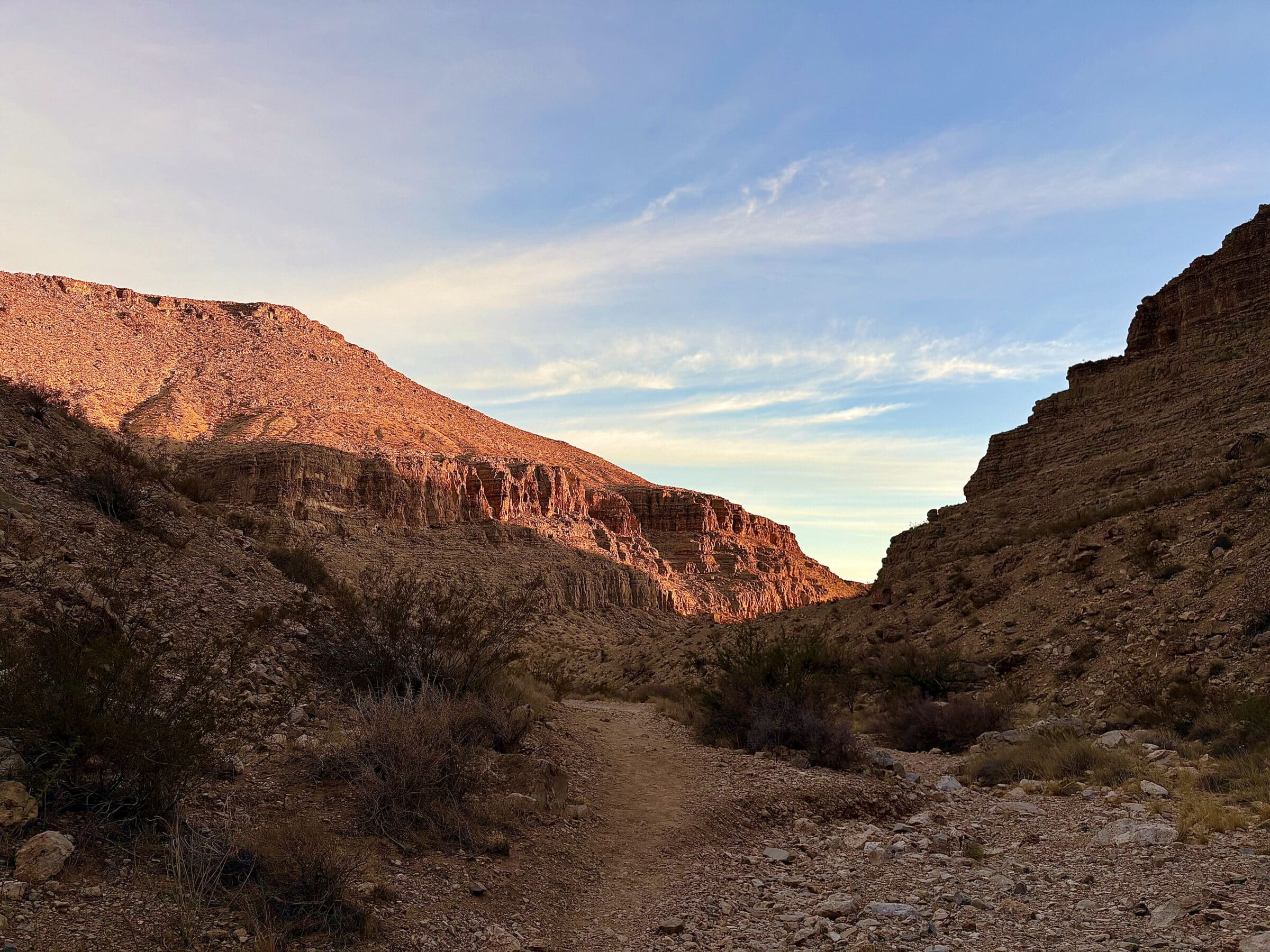
Christmas in California might lack a Dickensian winter atmosphere, but Randi and I went on a lot of local walks on this trip and we still appreciated everyone who made an effort with their lights. (Partly we just needed the walks to offset the effects of Yorba Linda’s finest eateries: Wise Guys Pizzeria, Burrito Brothers and the majestic YLS Bakery & Cafe, whose croissants alone could be wrapped for a stocking filler.) The festive spirit really ramped up on Christmas Eve when Alex and Randi rescued a stray husky from having to spend the night alone on the streets, and at the mercy of the local coyotes.
Thankfully, Dakota was reunited with her owners on Christmas Day, which also featured a Trader Joe’s cinnamon bake, Randi’s incredible strata, mimosas, a sunny walk with a view, unnecessary fear of hibernating snakes, Beth and Stewart’s legendary chicken dish, a trip to East Lake to see the seriously impressive Christmas lights, some all-important hot tub time and, of course, Doctor Who!

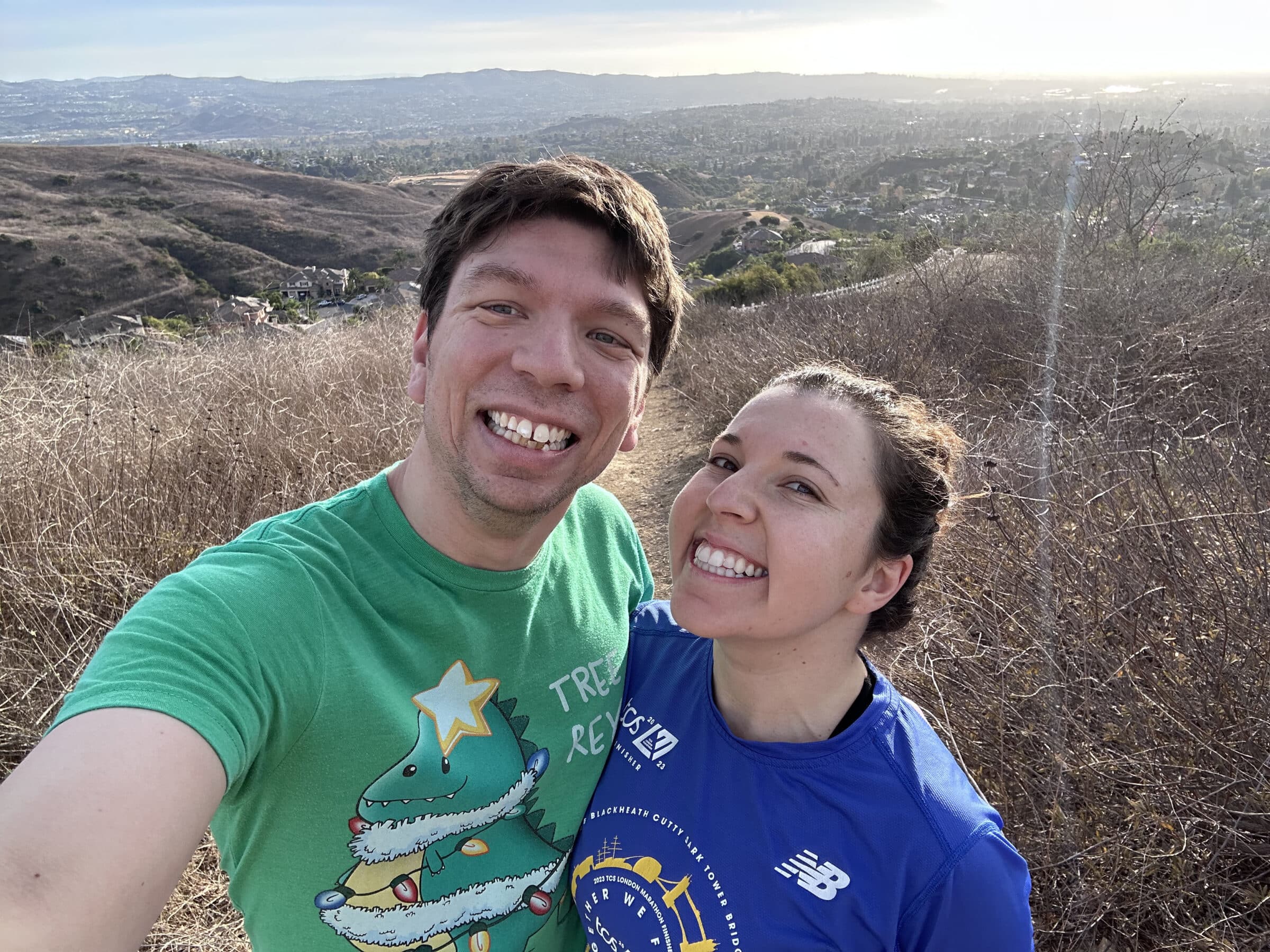

For Boxing Day, the traditional rainy walk was swapped for Laguna Beach, one of Randi’s favourite places and boasting a chilled linear park alongside the beach. Over the next few days we also spent some time with the Shelanksys, Elana and Alex’s friend Brian before Jeff’s funeral was arranged for New Year’s Eve. I also used this time to help digitise a bunch of old family videos, which (a) is basically my dream project, and (b) taught me that at least some families made sure to set the time and date stamp on their cameras correctly.
In all seriousness – this had actually been on my mind for a little while since Randi mentioned that she knew there was some video footage of her childhood lying around somewhere, and the subsequent wildfires in LA have been a sad reminder of how vulnerable these things can be. PSA: Backups are great.
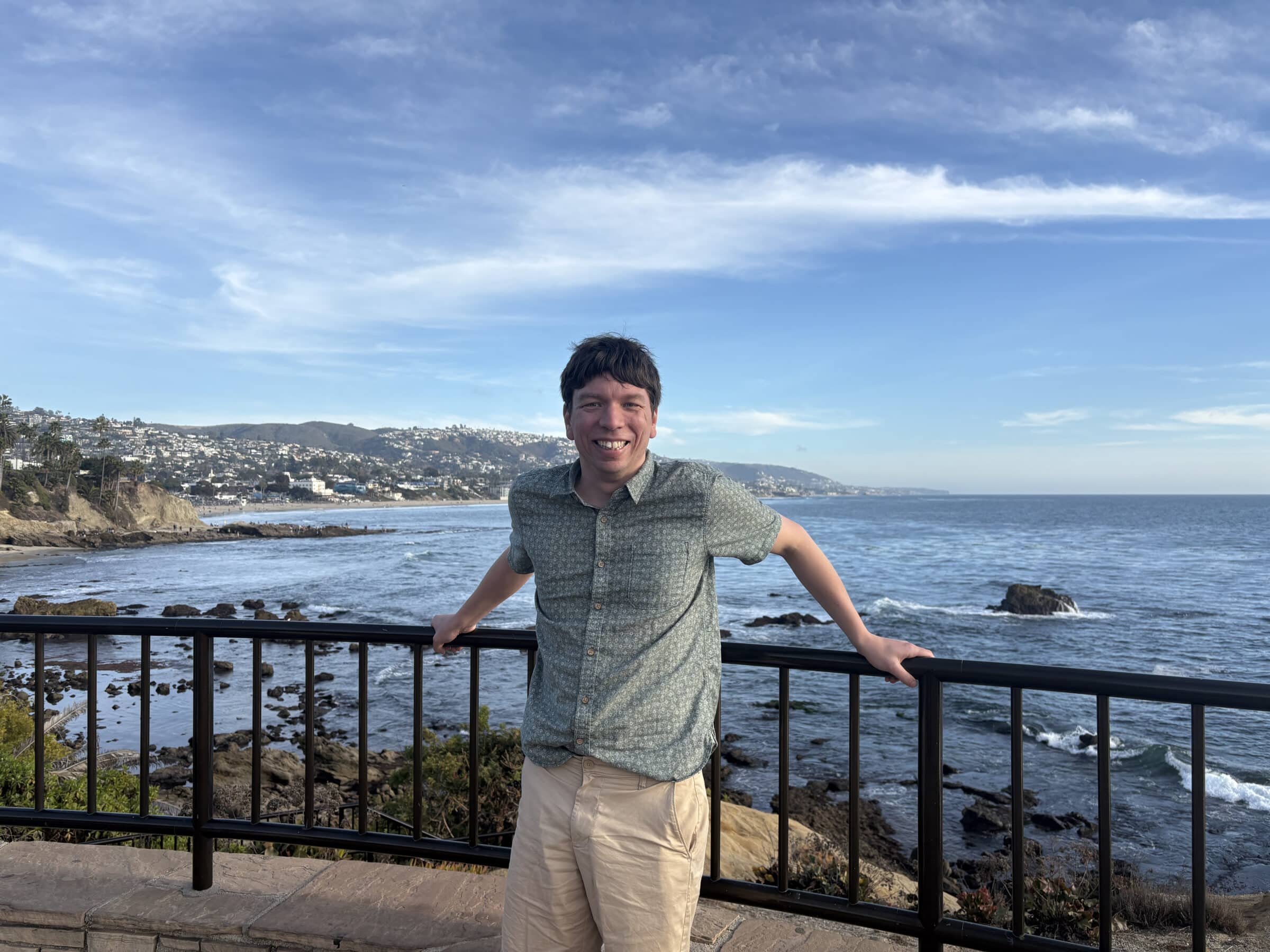

As 2025 approached, we repeated our trick from several years ago by using London’s fireworks as a convenient 4pm midnight. In our defence, we had a rescheduled 8am flight to Chicago the next day. And then hello again, Chicago! Happily, we made it to Catherine and AJ’s in time for a timeshifted New Year’s Eve celebration featuring 100% perfectly made dumplings and lots of toddler playtime.
At times when said toddler was in bed – or at least supposed to be – Catherine and AJ introduced us to the first season of Severance, which (as promised) is excellent and I’m excited to finish with Randi when she’s back from her bonus week in Chicago. We didn’t venture out very much, but we did enjoy a wonderful afternoon with Jason and Carrie followed by a delicious dinner at Mano a Mano (it’s not a restaurant, it’s a “neighborhood pasta project”) with Toggolyn.
Finally, just before leaving for my flight home, it was really nice to see Catherine’s cousins again, even if I did feel under some pressure when I was made to place all of the US state names into the correct boxes on the giant floor mat. (Honestly? I’m pleased with my performance, and perhaps some of those states would be happier in their new locations anyhow.)
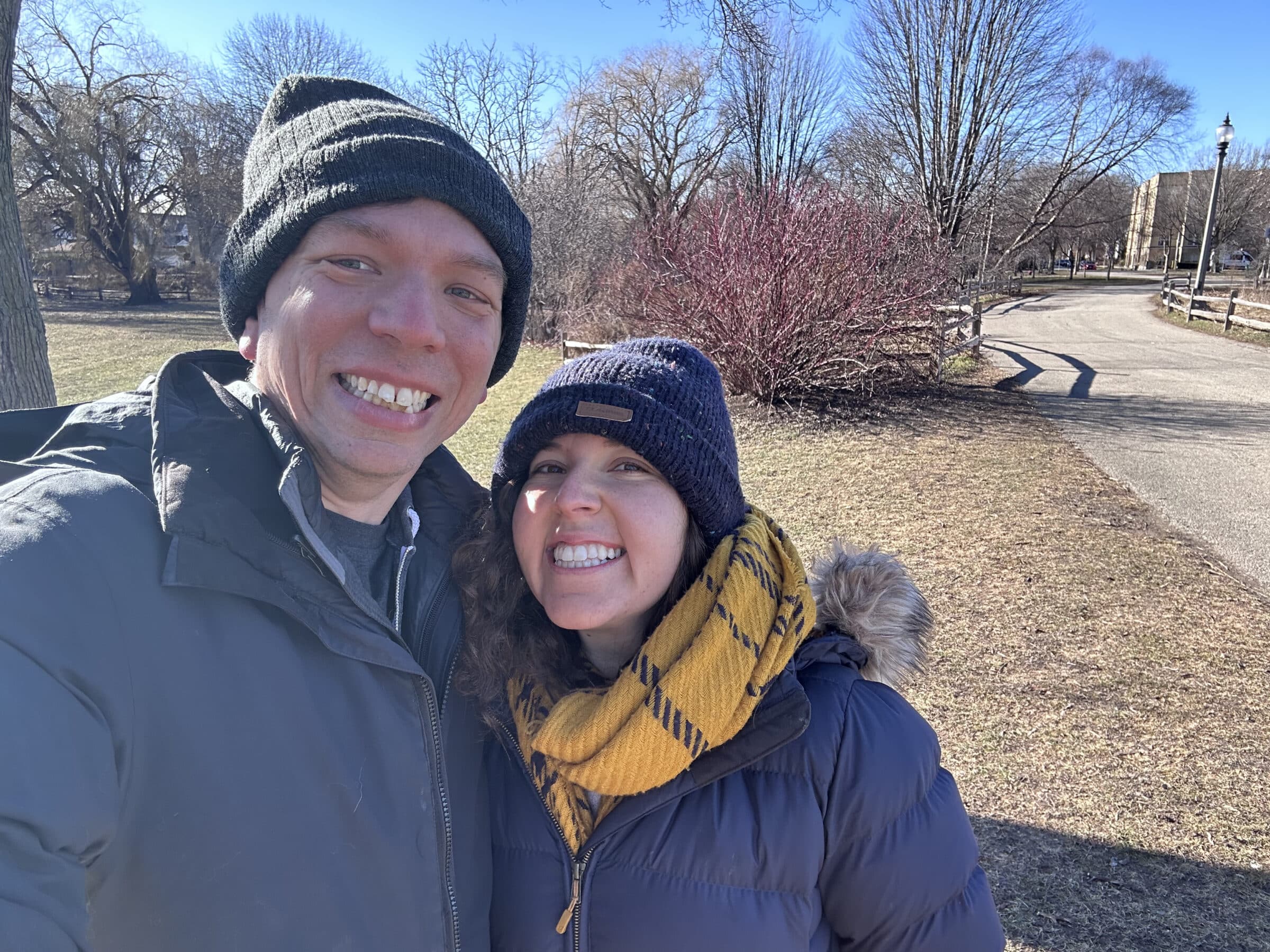
After a week back at work, many thanks to Andrew and Bonnie for plying me with wine last night for a fun Friday unwinding, and then staying up to 3am to comb through our own family’s tapes! For tonight – my last night before Randi returns from Chicago – I am reminded of Catherine’s young cousin suggesting thoughtfully that maybe I could “host a boys’ night” in her absence. I’m sorry to say that I did not do this. For partial credit, though, I did watch Katie’s latest “break glass in case of Randi absence” film: Beyond The Infinite Two Minutes, an hour-long Japanese comedy from 2020 about some very limited (and not particularly useful!) time travelling hijinks, which was short and sweet. (Probably short enough for Randi, in fact…)
Annual Roundup
For us, 2024 was very much shaped around the UK general election. Randi worked from Scotland a lot during the first half of the year, and I always enjoyed my own visits there – especially when Catherine and AJ joined us to canvass! That said, Rishi’s surprise early election was a real gift to us as a couple: not only did we get to enjoy an unexpected summer together, but the election itself took place in daylight rather than the dark.
The latter half of the year came with some tough news for people close to us. My love this year goes especially to Cormac. At the tail end of 2024, Randi also got the news that her uncle Jeff had died. He was a wonderful man and always incredibly kind to me. I’m so glad he got a chance to visit our flat for our wedding a few years back, and we enjoy the artworks he gifted us every day on our kitchen wall. One nice thing for me during these times has been the flurry of voice note activity in the Self Siblings WhatsApp chat, even if 2024 was also the year our emoji was ruined (still mad about that). I’m hoping for some happy voice notes there in 2025.
Travels
- Lisbon & Porto (January) – Such a great trip, combining Lisbon with Mike and Melissa (highlight: the Moorish Castle at Sintra) with a work visit to Porto to meet team members Vitor and Paulo and finally try a Francesinha for lunch. My only regret is that I didn’t have longer to see more of Porto.
- Edinburgh & Midlothian (So often I lose count…) – So many visits, including The One With Catherine & AJ, The One With Rosslyn Chapel, The Election One, The One With The Wild Swimming and The Christmas Hanukkah One. Thank you to everyone who opened the door to my door knocking!
- Bergen (March-April) – Aside from some sickness, this was a perfect little Easter getaway combining beautiful hikes, delicious fish and the 24/7 Robot Wars channel.
- Norfolk (July) – We stopped here on the way home from the election for Cat and Brian’s beautiful wedding.
- Paris (August & October) – First a crazily long “school trip” day to see the Olympics, then later a work trip for a focus group and Moulin Rouge.
- Exmouth (May & August) – A tale of two bank holidays to see my mum: once for her birthday, the second with Randi for a lovely walking and cycling minibreak!
- Bosworth (September) – On a weekend trip to see Andrew and Mark, we were taken on a tour around the site of the Battle of Bosworth Field.
- Amsterdam & Haarlem (October) – Randi tagged on to the end of my work trip to Amsterdam for a glorious weekend in Haarlem. Helmets please, we’re British.
- Bath (November) – Inspired by meeting the owner of a café at Matt and Rachel’s wedding, this unscheduled trip included a riotous evening with Will and Zoë and an educational trip to the Roman baths.
- Gdańsk (December) – Our emergency Christmas Market weekend, and a much-needed food-filled boost to the festive season, including the simple but delicious pork cutlet and mash at Bar Turystyczny when we were both craving a simple Polish sit-down meal.
- Vegas & California (December) – Not what we originally planned due to the sad death of Randi’s uncle Jeff just before our visit, but a very good place to close out the year all the same.
Live!
- A Mirror (February) – Courtesy of Alix and Adam, we gladly accepted our ‘wedding invitation’ for this dystopian thriller along with David and Ginger.
- Macbeth (March) – Fiery modern production, in a literal sense. Saw this with Kira who reckoned Lady Macbeth was nothing compared to Soviet wives.
- The Picture of Dorian Gray (March) – Also with Kira, this was Sarah Snook’s incredible one-woman take on Oscar Wilde’s only novel.
- West Ham v Liverpool (April) – The action on the pitch was nothing compared to the gruff emoting from the two guys behind us. But a 2-2 draw, for the record.
- Eurovision (May) – With Katie and James! My name is Windows, Windows95man, and I only live by one rule, and the rule is… no rules!
- Two Strangers (Carry a Cake Across New York) (June) – As noted by the two insufferably smug AI-generated hosts on my Spotify Wrapped podcast, yes, the sudden change in my listening habits in June did happen right after I saw this wonderfully uplifting musical with mum and Tash.
- Water Polo at Paris 2024 Olympics (August) – “Wait a second… where’s the net?” “Dom, have you confused water polo with water volleyball…?”
- My Father’s Fable (July) – Another excellent play at the Bush, with lots of semi-successful speculation during the interval about the big reveal. And then when it came, the audience made their feelings known!
- The Murdér Express (August) – Randi’s very fun birthday gift to me. Immersive theatre over dinner, featuring dodgy accents, bawdy jokes and a gregarious couple from Florida seated opposite.
- Hadestown (September) – Way down Hadestown, way down under the ground… we enjoyed this West End musical with Mike and Melissa on their trip to London, prefaced by some themed cocktails at the bar beforehand.
- The Red Queens (October) – Randi’s colleague Terrie performing with her band at Fiddler’s Elbow in Camden on a Sunday night. Very nostalgic.
- The Real Ones (October) – One of my favourites from the Bush, about the waxing and waning of a friendship forged in teenage struggles.
- Statues (November) – Staged in the Bush’s smaller studio space, a funny but intimate show about a grieving man discovering audio tapes of his father Mustafa, and best friend Omar, from their teenage years.
- Wolves on Road (November) – The final show from our Bush Theatre trio this autumn. Some mixed performances, but a fun story about the rise and (predictable) fall of two crypto bros from east London.
- The Berberines (December) – Another of Randi’s colleagues, Dan, in a band who sing delightfully chilled and folksy songs. The unorthodox venue on Saulsbury Road promoted great nostalgia in my family WhatsApp chat. The drinks came courtesy of the pub opposite.
On Screen
One problem with this format is that it makes it seem like I’m a big movie buff, and then the actual list turns out to be incredibly disappointing. In fact – sad to say – I made it to a grand total of 0 films in the cinema this year. I’d like to do better in 2025, although the truth is that podcasts are a much bigger part of my life. Still, as ever, here is an incomplete extract from the ‘not-live’ list:
- The Bear – I can’t believe we only started The Bear this year! Three seasons later, we’re all caught up and very committed to this show about a Chicago restaurant (and so much more). Getting into this was a slower burn for me than for Randi, but all the characters (apart from Claire) are so human and complex – a perfect meld of writing and performing – that over time Carmy, Sydney, Richie, Tina and Marcus all feel like people that I know somehow. I think for many people it’s also the food which draws them in. That’s not true for me, but instead it’s Chicago itself: all of those beautiful shots of L trains snaking through the city. Highly recommended.
- Timecrimes – Katie recommends a lot of “films to watch while Randi’s away”, and here’s the first of 2024. A Spanish sci-fi thriller about an idiot named Héctor who makes one of the bigger cockups of time travel. Enraging but enjoyable.
- Anatomy of a Fall – Easily my favourite film of the year, and probably for a lot longer than that too. It won an Oscar, after all. Also very much appreciated watching it with my mum so we could pause and discuss at will.
- What We Left Behind – Wonderful documentary about Star Trek: Deep Space Nine which holds incredibly fond memories for me as something I watched with my dad growing up.
- Science Fair – The perfect Katie recommendation to watch with Catherine and AJ during their trip the UK. A lovely documentary from 2018 about various Science Fair kids. Simultaneously very American and international at the same time, but I still feel bad for the Brazilian students whose Zika virus research seemed strangely underappreciated. We also all enjoyed a good bout of LinkedIn stalking afterwards.
- Doctor Who – I was absolutely spoilt with Doctor Who this year, most obviously with Ncuti Gatwa’s first full series. After a bumpy opener (no, we didn’t like Space Babies) this turned into an incredible run of hits and a thrilling finale. I was so excited to have an excuse to rewatch the series with Randi after the election was over, plus catch up on her beloved Doctor Who: Unleashed. Finally, as always, Katie and I made our way through more classic episodes from the original run.
- Murder in a Small Town – Two-part Channel 5 documentary from 2021 about the murder of teenager Jodi Jones in Dalkeith. We were forced to watch this.
- The Outfit – A stupid film about an English tailor in Chicago which my mum and I loved to hate on. “I’m not a tailor; I’m a cutter” – no one cares, mate.
- The King of Kong – Documentary about one nice man, who’s just innocently trying to set a world record at Donkey Kong, being continually thwarted by utterly awful people.
- Murder is Easy – The Agatha Christie adaption from last Christmas which I waited all the way until the summer to watch with Randi and absolutely was not worth it.
- Nyad – Somewhat misleading biopic about long-distance swimmer Diana Nyad. Still very much enjoyable, but do check her Wikipedia page afterwards.
- Mean Girls – So 2024 turns out to be the year I can finally, finally, finally stop saying “I’ve never seen Mean Girls”, just in time for there to be a 2024 reboot which I haven’t seen instead. But I enjoyed the original!
- Ecstasy of Order: The Tetris Masters – Documentary about a group of people who have all watched The King of Kong and now want to be in a documentary themselves, but have more self-awareness than the original cast.
- Coherence – Ah, this was another really great Katie recommendation. Probably my second favourite film of the year, even though it creeped me out when watching it alone at night. I do think I’ve discovered a logical flaw in the alternate reality hopping plot, though.
- Inside Out 2 – Wasn’t sure what to expect, but I actually really enjoyed this clever sequel to Pixar’s 2015 original in which Riley enters puberty and is suddenly beset by the unhelpful new emotions of Anxiety, Envy, Embarrassment, and Ennui. I watched this on the plane to Vegas and especially chuckled at the “sar-chasm” pun.
That Moment When…
- …after the vodka comes out, the conversation with my aunt and uncle turns to the one-worlders vs. the two-worlders, and it’s stayed with me ever since.
- …I read the following question aloud to Randi one night from her official ‘Life in the UK’ practice test book: “In which country was the composer George Frederick Handel born?” and the options are: (A) Iceland, (B) Russia, (C) Japan, (D) Germany.
- …I get into a Wikipedia edit war with a teenager while hiding in a hotel bathroom.
- …we suddenly spot a young child wandering alone in the middle of a main road, and a group of strangers are suddenly bonded together for a short but intense period before he’s safely reunited with his family.
- …I meet Randi after work for dinner, and we deliberately avoid sitting next to the BBC’s Chris Mason.
- …Randi totally blows up our street’s WhatsApp group while struggling to open four jars of salsa verde.
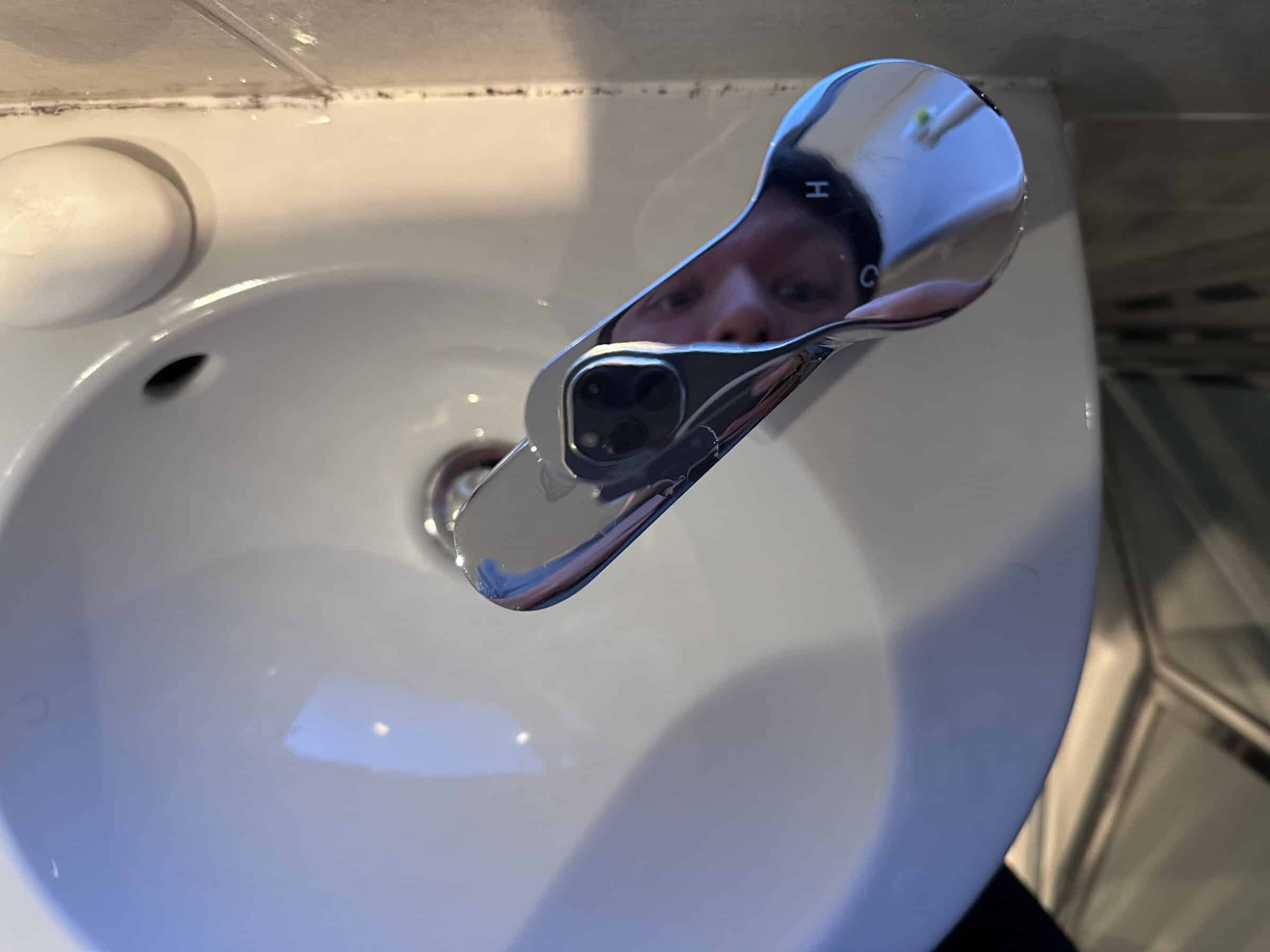
Here’s to 2025!
Meanwhile, here’s a very quick summary of Randi’s year in plants:
I have mixed feelings about my reading this year. On the one hand, I only managed 22 books, which is very few. Part of this is just down to our travelling patterns: mostly short weekend breaks, and no long holidays affording lots of precious reading time. On the other hand, when I did find time I’m pretty pleased with my selection. It was a good range, with lots of highlights, a nice mix between old and new, and plenty to recommend to others. So, here’s to another year of books!
Fiction
I loved The Fraud, my first book of 2024, not least because Zadie Smith has returned to writing about London rather than New York. Gloriously, even in this nineteenth century historical novel she manages to include the fields, farmers and ‘grassy Willesden Lane’ of Kilburn, Kensal Rise and that patch of North West London where we both grew up. I even loved the book itself: a signed, chunky hardback in a gorgeous cover and enigmatic black-edged pages.
Contained within those pages is a story based on the real-life Tichborne case, a fascinating example of Victorian populism in which a working-class man, and obvious fraudster, claimed to be the long-lost heir to a wealthy family fortune. Despite being convicted of perjury – or, rather, thanks to the widespread coverage of his trial – he received enormous public support, symbolising the empty claims of the justice system when the interests of the rich and powerful were challenged. Of course, the central conundrum is that if he really had been the missing heir he wouldn’t have been ‘a man of the people’ at all. So his folk hero status actually relies on the fact that, at some level, people must know that he’s lying to them, while still acting as a tribune for public anger and disaffection. The political parallels for our era are obvious, but this isn’t a preachy book, just an invitation to think deeply about what it means to be a fraud.
I also really, really enjoyed reading The Night Circus, by Erin Morgenstern, although I have no memory of how it ended up on my to-read list so I’m not sure who to thank. This is a dazzling fantasy about a magical travelling circus, which serves as the stage for a sinister contest between two young magicians who have not chosen to play and do not know each other’s identity. The only thing I wasn’t totally spellbound by was the romance at the centre of the plot, but then again, perhaps a romance isn’t always supposed to make sense. Regardless, this is highly recommended, and images of the night circus have lingered in my brain long after reading.
Sticking with fantasy, this year I also started NK Jemisin’s Inheritance trilogy with The Hundred Thousand Kingdoms, and my reaction was a resounding hmmmm. This was Jemisin’s debut novel and it very much reads like a rougher, first-draft version of her later The Broken Earth series, which I adored. A lot of the same ideas are there but it just coheres less well together, with certain elements – such as the love between Yeine and Nadahoth – happening too quickly. Yeine is meant to be investigating her mother’s murder, but the tension isn’t high enough because for most of the book she’s just waiting to die. With all that said, I’m still excited to keep going with the series, and perhaps my only real problem was reading Jemisin’s perfected version first.
I also did not love Ottessa Moshfegh’s Eileen. Dare I say it, but I think it was just too dark for me; or rather, too claustrophobic, with a very slow build up to a grotesque climax. It’s usually very annoying when a reviewer complains about “unlikeable” characters – it’s a book, not a date – but this really is the ultimate test of a novel constructed entirely of deeply, deeply unlikeable characters. Reader: this makes me feel old, but I failed the test. You may have better luck.
Talking of books being ‘too dark’: for years I’ve wanted to read a Stephen King novel. Since I’m really not a horror person, I picked 11/22/63 way back in 2017 as a nice time-travelling historical compromise, and this year I finally got around to reading it. Despite being long – really long – I did really get into this, even though the minutiae of Lee Harvey Oswald’s life never particularly grabbed me, and the central premise of the time traveller’s escapade – that preventing the assassination of JFK would lead to a transformationally better America – is so obviously ridiculous. Perhaps if Jake Epping had been a high-school history teacher, rather than a high-school English teacher, he would have figured this out sooner. Still, it was a lot of fun to read (barring the odd descent into overly-graphic violence) although coincidentally Trump narrowly escaped an assassination attempt while I was midway through, which was very weird.
Continuing some series from previous years – The Bullet That Missed was my favourite entry in Richard Osman’s Thursday Murder Club mysteries to date, and I (mostly) enjoyed the characters much more than I normally do. The plot was also the right balance of ‘clever, but not so clever that I couldn’t follow the ending’. Meanwhile, in Maya Angelou’s autobiographical series, I’ve reached book four – The Heart of a Woman – and my main takeaway is that her relationships are always so terrible!
Ben Aaronovitch’s latest Rivers of London novella, The Masquerades of Spring, was a lot of fun. Set in 1920s New York City (but not in an objectionable Zadie Smith way), the main character – Augustus Berrycloth-Young – is an entirely undisguised Bertie Wooster clone, so much so that it feels like an official crossover. And who wouldn’t want to read Augustus/Bertie bumbling around with Nightingale whilst investigating a haunted saxophone?
Over in rather more weighty universe, this year I also read the second book of Hilary Mantel’s Cromwellian epic, Bring up the Bodies, and the good news is that the sequel fixes her annoying writing habit from the first book of making it really ambiguous who is speaking half the time. Overall, I think I enjoyed this more than the first, helped by a tighter focus on a singular event. This novel is squarely about the downfall of Anne Boleyn, and while obviously her execution for adultery is horrific by modern standards regardless of what she did or didn’t do, all of the intrigue and plotting leaves me very curious about whether any of the confessions from her lovers – extracted under torture – contained any kernel of truth at all. A master study in the orchestrated downfall of someone who once seemed so powerful.
Stuart Turton’s The Last Murder at the End of the World is still not as good as his debut – The Seven Deaths of Evelyn Hardcastle – but Emory is such a great hero to root for that I still kinda loved it. It also helped that the island setting was so vivid and evocative to me. It reminded me of that time in primary school when you have to draw a map of an island with coordinates, and I loved the idea of a single place with all of the world’s natural features – mountains! volcanoes! jungles! quicksand! – all crammed together. Anyway, this story is about the curious, inquisitive villager Emory trying to solve a murder in a post-apocalyptic world where everyone’s memories have been wiped. There’s also an omnipresent AI narrator, Abi, a countdown to humanity’s extinction thanks to a deadly advancing fog, and so many twists and turns that I would have to re-read the book to remember everything properly. But I can think of worse things to do…
I wish I had a better memory for plots in general, because then I would have enjoyed linking up the characters from Emily St John Mandel’s The Glass Hotel with its sorta sequel, Sea of Tranquility, which I accidentally read first in 2022. As it is, I still really enjoyed this novel about half-siblings Paul and Vincent, whose lives briefly converge while working at a hotel on Vancouver Island in Canada. Mostly, however, their stories are separate but intertwined, as Paul is forever haunted by a terrible incident from his student days and Vincent becomes a trophy ‘wife'(ish) to a Bernie Madoff-esque character who is running a giant Ponzi scheme. To be honest, I’m always nervous writing about Emily St John Mandel books, because I fear Todd will come running to ask what it was “really about”. I don’t know exactly, Todd, but I’m still down for another one.
I have so much to say about Naomi Novik’s Uprooted. This is partly just because I read it shortly after Randi, so we could actually discuss it while it was still fresh in our minds. But I was also struck by a well-written review on Goodreads by someone who absolutely loathed it thanks to the ‘abusive’ relationship between the ‘Dragon’ – a cold, seemingly ageless wizard who guards over the local village from his tower – and seventeen year old Agnieszka, the latest in a long line of village girls who is selected by the Dragon to live with him in the tower for ten years. Of course, in an obvious sense, the reviewer is clearly right, and I respect anyone who decides this book just isn’t for them. But fundamentally, the most magical thing about Novik – just as with Spinning Silver – is her ability to draw you in to a completely different, much more feudal mindset of interlinking rights and obligations which is utterly alien to how a modern character would experience the world.
If you can embrace this, then Uprooted is a gripping story about the development of Agnieszka’s own magic and the terrifying menace of the Wood. I loved the descriptions of magic being performed – the best I’ve ever read – and although the contrast between the Dragon and Agnieszka shades a little close to the ‘women are more natural and intuitive’ trope, Novik avoids making anything too one-sided. My main criticisms of the book are two-fold. Firstly, I did not buy Agnieszka’s friend Kaisa as a character. She seemed surprisingly underdeveloped compared to everyone else, and seemed to exist solely so that Agnieszka could be protective of her. Secondly, the magic system itself was too vague for me, so it was never quite clear why some things were possible and others were not. I also feel that the ‘corruption’ of the Wood could have been pushed even further. But these niggles just illustrate how strongly Novik’s writing implants itself in my head. Highly recommended if you enjoyed Spinning Silver (looking at you, Reema).
This year I’m also proud of myself for finally reading The Odyssey. And by gigantuan good fortune, I wasn’t far along before Randi and I happened to stay with a bone fide classicist over the weekend, so all I had to do to get answers to my dumb questions was look up from the sofa and ask. To be fair Emily Wilson’s translation (which we may affectionately term the ‘woke translation’ for its emphasis on slavery) is superb for rendering Odysseus’s adventures in crystal clear English. What really surprised me is how early his voyage concludes; Odysseus is back home long before the final verse, and after that his lengthy, drawn-out sequence of elaborate disguises and endless loyalty tests – before, spoiler alert, he murders all his mother’s suitors in a massive bloodbath – is less engaging. Well, less engaging to me. I don’t think anyone is reading this blog for an original take on Homer. Although, personally, my gut feeling is that since Odysseus is continually shown to lie about everything – to everyone! – that actually all of his stories are made up.
I’m still working my way through Sherlock Holmes – in a process which has been ongoing since 2010! – and this year I reached Doyle’s fourth and final novel, The Valley of Fear. This was a good one, actually, with its sinister second half about a murderous Freemason gang set in 1870s Pennsylvania. Even more fun was Eric Ambler’s Uncommon Danger, which is like all other Eric Ambler thrillers (amateur hero becomes embroiled in international intrigue) but is a particularly good specimen of the genre. Set in 1930s Austria and Czechoslovakia – including some genuinely tense nighttime border scenes – the indebted freelance journalist Kenton comes into possession of some incriminating Russian documents before alternating between capture (boo) and escape (phew). You’ll wish you were on the run, too!
Finally for fiction this year, I read my uncle’s second novel: The Bard’s Trail! This is quite different to his first one – a fast-paced political thriller featuring murder on a plane (which I read on a plane), competing spy agencies, international terrorist plots and (unsurprisingly) an excuse to feature a Champion’s League final match. I really enjoyed this, although I miss being able to pull my usual trick when reading thrillers: a reference plot summary from Wikipedia on hand to keep all of the characters and plot strands straight in my head. But it was a fun way to close out the year!
Non-Fiction
OK, so I’ve owned a copy of The Writers Tale for a very long time – ever since Russell T Davies autographed it for me and my sisters when it was first published. But I hadn’t sat down and read it cover-to-cover until this year, with all of my renewed excitement about Russell’s return to lead Doctor Who. And it’s a fascinating text. Davies is so unflinchingly honest – at times, you can just imagine an editor emailing to check “do you really want to put this in print?” – but I’m left with even more appreciation for the man who saved my favourite show.
It’s very rare for me to read any books in the work-related realm, but I couldn’t resist Steven Sinofsky’s Hardcore Software, which is really just a compilation from years of his Substack posts. (As a result it’s overlong and would have benefited greatly from editing – but this seems to be a signature Sinofsky trait. He’s always writing memos!) Sinofsky had a long career at Microsoft in product management, climbing the ladder to lead the development first of Office and then Windows, and I’m really 90% here for nostalgia for the era when these products were exciting and “releases” meant something. For the days when my dad would buy a new computer, and it would come with Windows 98 rather than Windows 95, and there were new and shiny things it could do. That said, even though the context of my job is very different, it’s also fun to be able to empathise with challenges and dilemmas which are universal to building any software product.
I’ve wanted to read High Risers for a long time. Published in 2018, it’s a book about one of Chicago’s most famous public housing projects: Cabrini-Green, home to somewhere between 15-20,000 people at its peak in the 1960s. The thing which makes this different to the other books about Chicago that I’ve read (Gang Leader for a Day, There Are No Children Here) is that Cabrini-Green wasn’t “over there” on the South Side, it was “right here” where I used to live and work in Chicago, and not very long ago at all. I mean, I literally shopped in the Target which was built over one of the demolition sites. So I’m implicated, in a sense, as the type of person who was “made room for” when these buildings were torn down and its residents were displaced.
And yet… the book is clearly not written as a simple elegy for these large housing blocks. I don’t know how anyone could do that in good conscience about a place where, by the end, children were in such danger from stray bullets. One of the uncomfortable truths which comes up again and again in these books is that in the heady early days – when the homes were fresh and new, when the political atmosphere was optimistic, when new residents were excited to escape abusive landlords – the authorities exercised a high degree of selection about exactly which families were allowed to move in. So while the initial community may be poor relative to the general population, it still benefits from not being the “housing of last resort” that it later becomes. One of the most hopeful parts of the book is a brief period when residents of individual buildings are allowed to take control of their own blocks and self-organise: an experiment which is sadly cut short by demolition. But it could have been a more sustainable model.
David Runciman’s The History of Ideas was an easy read because it’s just a written version of the second series of his ‘History of Ideas’ podcast, which I’d already enjoyed and recommend to anyone who is interested in political thought. Conversely, I’d never listened to Andrew Copson’s What I Believe podcast, but given that he was hosting me it felt rude not to pre-order his new book. This is an engaging series of discussions with prominent humanists about their philosophies on life: a quick read, and a nice tour through a lot of very reasonable people’s heads. My favourites were Nichola Raihani on cooperation (because I’d already heard about some of the research here about why different cultures have different attitudes about loyalty to kin, and it’s fascinating) and Ian McEwan on the novel being a “fundamentally secular” form. “If you want literature to worship God, then poetry is, I think, the perfect form. Otherwise, the monograph or the prayer and the hymn. The novel is too pluralistic for religion, too tolerant. It is indeed the ultimate humanist form.” I don’t know whether this is true or not, but it does give me a nice excuse for my lack of poetry.
Finally, I also read Siddhartha Mukherjee’s The Song of the Cell. I’d still recommend The Emperor of All Maladies as his greatest work, but you’re always in good hands with Mukherjee to guide you through the wonders of human biology with a reassuring doctor’s touch. As always there are lots of interesting facts which I quickly forget, but the overall impression is of the incredible ecology of cells working together to form one person like you. We’re used to thinking of the heart as “a muscle which pumps blood around the body”, but how do individual cells possibly form a mechanical ‘pump’? How does the immune system differentiate between the self and the nonself? We’re so fortunate to live in a world which has made so much progress in understanding how this works, and with so many people dedicated to taking us further still. And to be able to curl up with a book which summarises the past century or two of these discoveries is its own special joy.
Happy Christmas Eve! Since I’m in the US until New Year, I thought I’d post this ‘lost blog’ from 25 years ago. It was my second-ever visit to the States, and the first time I kept a diary…
Day 1. Wednesday 31st March 1999.
My mum and I were given a lift to Paddington Station by my dad and my two sisters. We caught a very nice train with a T.V. in it to Heathrow airport. Then we caught a Virgin plane to Washington DC. On the plane it was wonderful, there was a T.V. and games console on the back of every seat! I watched the Rugrats movie and played a lot of games. It took a while to be immigrated but when we had got all our luggage we saw our friend Sharon and drove home. I watched The Simpsons then went to bed.
Day 2. Thursday 1st April 1999.
Today we went to the Smithsonian ‘Air and Space Museum’. We saw lots of planes and space rockets and we saw two movies called ‘To Fly’ and ‘Cosmic Voyage’. These are special movies because the screen is so big you feel you are actually there, as you can’t see anything else. These are called IMAX films. The Smithsonian is actually a block of 16 museums and a zoo, but 2 of these are in New York. The museums range from the ‘Air and Space’ to the ‘Portrait Gallery’, the ‘Natural History’ to ‘American History’. After that we went home, watched The Simpsons, had tea and went to bed.
Day 3. Friday 2nd April 1999.
Today we woke up at 6:30 so we could go to the White House, where all the presidents of America live. The current one is William Jefferson Clinton, the forty-second president. You get free tickets for the White House, mine is stuck in the yellow section of this book. We got a guided tour and I bought a book all about the different presidents. After that we went to have lunch in an ice-cream parlor in the museum of American history. As entrance to museums is free, we didn’t look at the exhibits, we went straight on to the Natural History Museum\Museum of Man. We saw dinosaur bones and a real life tarantula eat a beetle. After that we went home, watched The Simpsons (one of them was a Treehouse of Horror!) and went into the car again at 7:00. This was so we could see America’s famous buildings in the dark. We saw Abraham Lincoln’s (the sixteenth president) memorial. It’s like a temple with a statue of him in. Then we saw the Vietnam memorial, which is a big wall with the names of the people who died in the Vietnam war inscribed on it. Then we drove back home and went to bed.
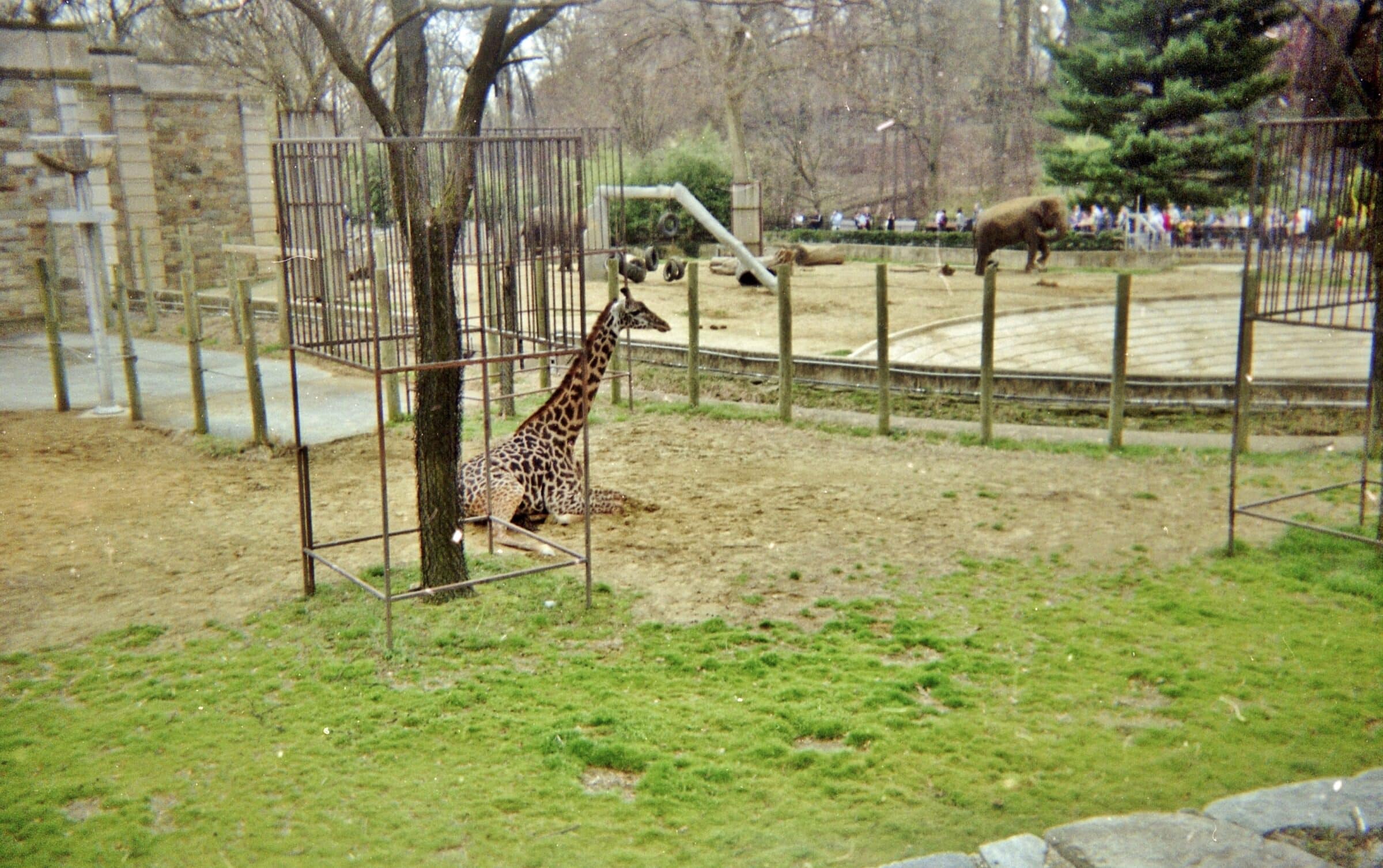
Day 4. Saturday 3rd April 1999.
This morning we woke up at about 7:30. I had breakfast, an egg and a roll, and then at 10:00 we went to the zoo. I saw lots of things, like giraffes sitting down, kangaroos with babies in their pouches, a gorilla family and birds. But, my favourite animal was definitely the panda bear who was eating bamboo. I also saw an exhibit about teaching chimpanzees a language, and I spotted a mistake. They were teaching it numbers and they had written down: 0 1 2 3 4 5 5 6 8 9 instead of: 0 1 2 3 4 5 6 7 8 9. When I told the man in charge of the exhibit about it he said he knew but he said I was the only one to spot it in 3 years and he gave me two free magazines. When we got back we were quite busy because Sharon had invited her mum (Pat,) her dad (Leo,) and her brother (Paul) to dinner. We talked about alot of interesting things, and they left at 9:30. If they came at 6:00, that’s 3 and a half hours. Luckily The Simpsons wasn’t on on the weekend so I went straight to bed.
Day 5. Sunday 4th April 1999.
On Sunday I woke up at about 6:30, but because they had moved the clocks forward it was now 7:30. My mum gave me an easter egg and then we drove to the train station. It was very big and fancy and we got on a train to Philadelphia, Pennsylvania. It took about 2 hours to get there. When we got there we met Roger and Lily-Ann, my grandmas cousins. We drove to downtown Philadelphia and had lunch in a fairly posh restaurant. Then we went to the Franklin Institute, which is like a science museum. It’s really fun, I saw another IMAX film, mysteries of Egypt. I also had my picture drawn by a robot, I saw a robot playing basketball and I went inside a huge heart, which is quite dark. In Philadelphia, I also saw Independence hall and Liberty bell. When the train arrived back in Washington D.C., I had supper in a pizza restaurant, drove back to Sharon’s flat then went to sleep.
Day 6. Monday 5th April 1999.
I woke up at about half-past 7 on Monday, the first thing we did was to get tickets for the Bureau of Printing and Engraving, then we walked around the tidal basin a big man-made lake. We saw the cherry blossoms in full bloom, and we also went to the Jefferson memorial. Thomas Jefferson, third president of the U.S.A., was the one who gained independence from Britain. After that, we went to the Bureau of Printing and Engraving, where they make all of the money in the U.S.A. and most of the stamps. I actually saw the old $10,000 note! After that we had lunch at the Holocaust museum and then we saw a very moving exhibit about German Jewish children. After that Sharon and I rented a paddle boat while my mum went to an art gallery. We had alot of fun and when mum had paddled for an hour, we went home, watched The Simpsons and went to bed for a wonderful night’s sleep!
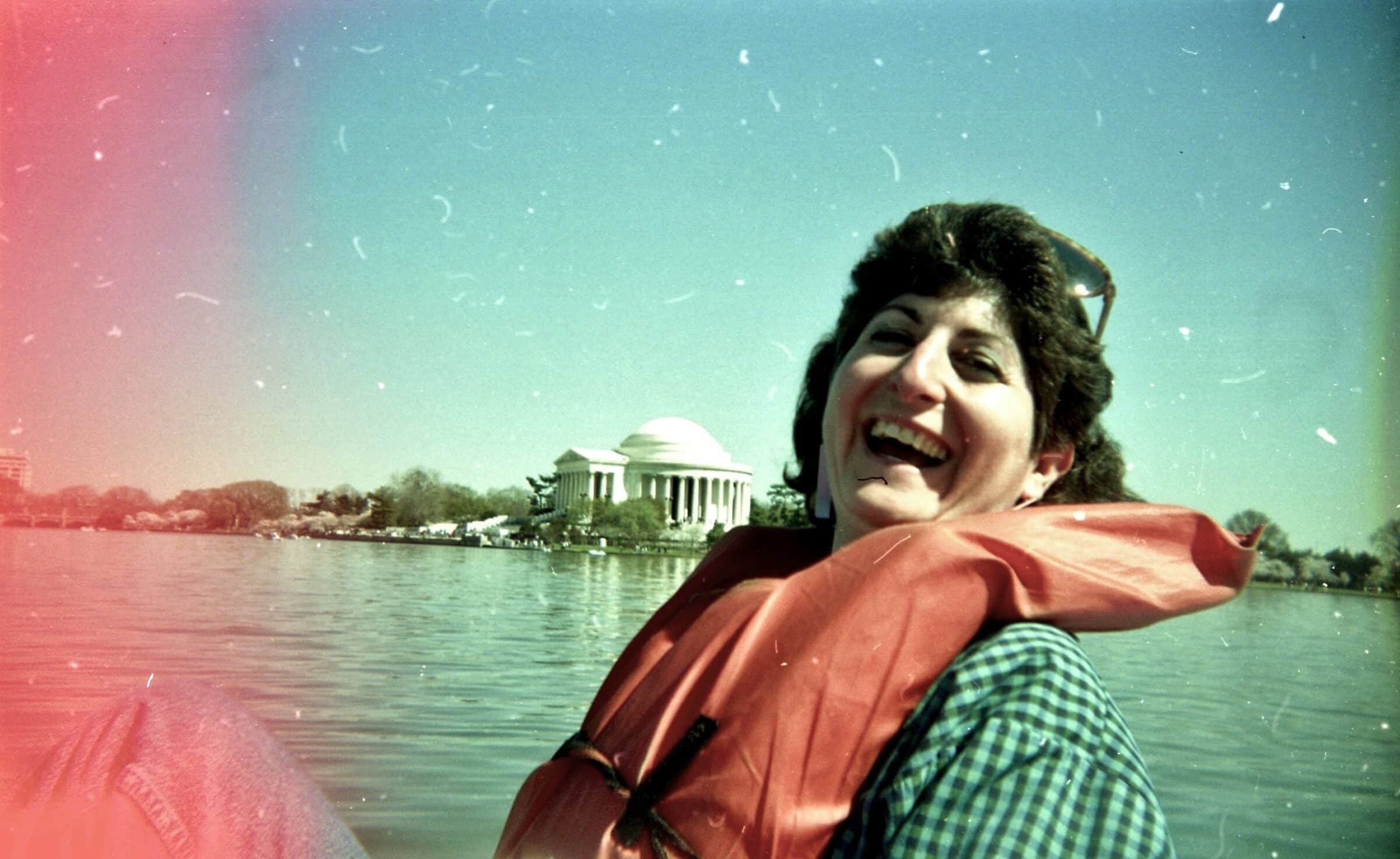
Day 7. Tuesday 6th April 1999.
This morning we got on the train to go to Capitol Hill. Sharon wasn’t with us because she had to go to work. We queued for 4 hours because the line moved ever so slowly, l……….. i…….. k…….. e……. t……… h…. i……….s! When we finally got in the tour guide showed us lots of things including the whispering chamber, where you whisper into the floor and people hear you across the room. We also saw the place where President Clinton was on trial. After that we had lunch in a restaurant near the capital. I had a cheeseburger and french fries. We went home, I saw most of The Simpsons, (but I missed a bit of the first one,) then we went to the Queen Bee, a Vietnamese restaurant. I didn’t have any food, but my mum and Sharon did. Then we went home and I went to bed.
